
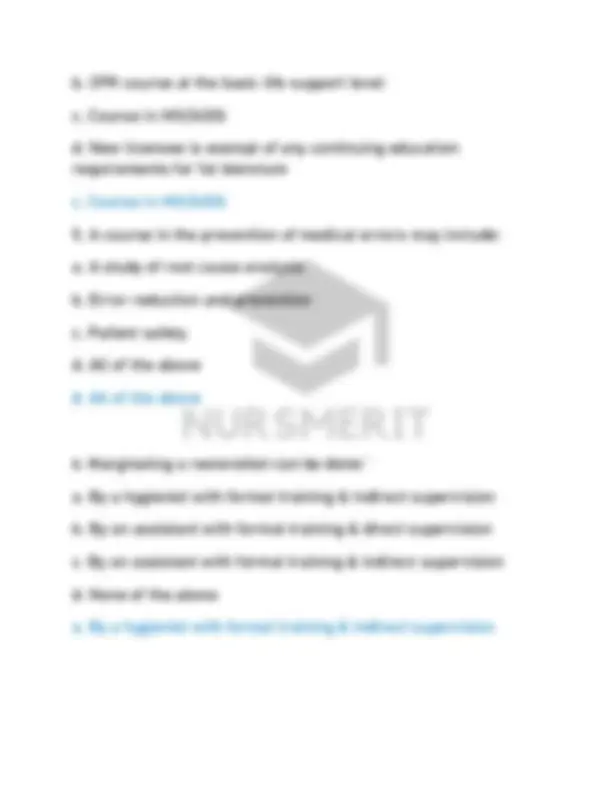
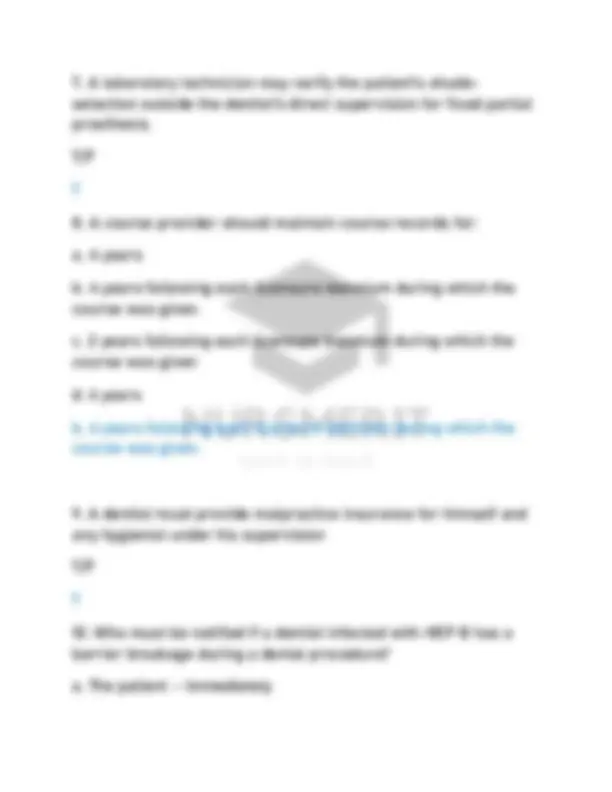
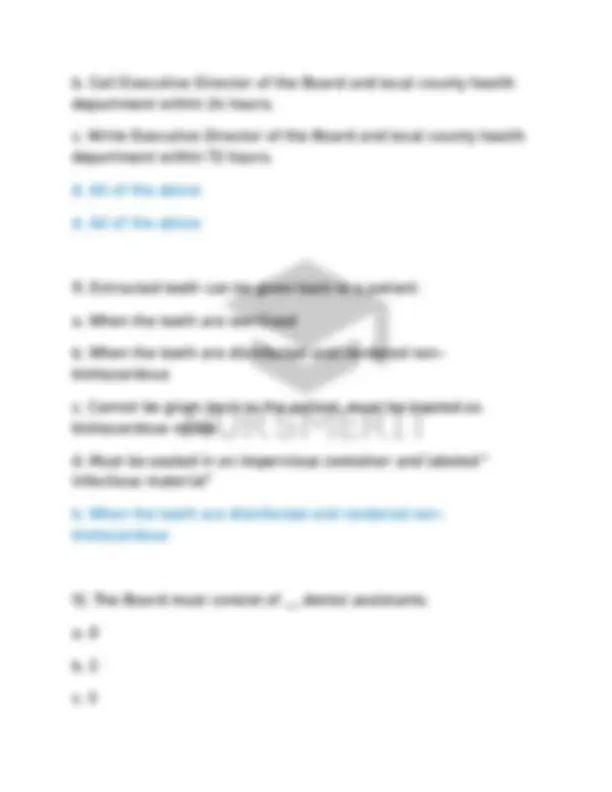
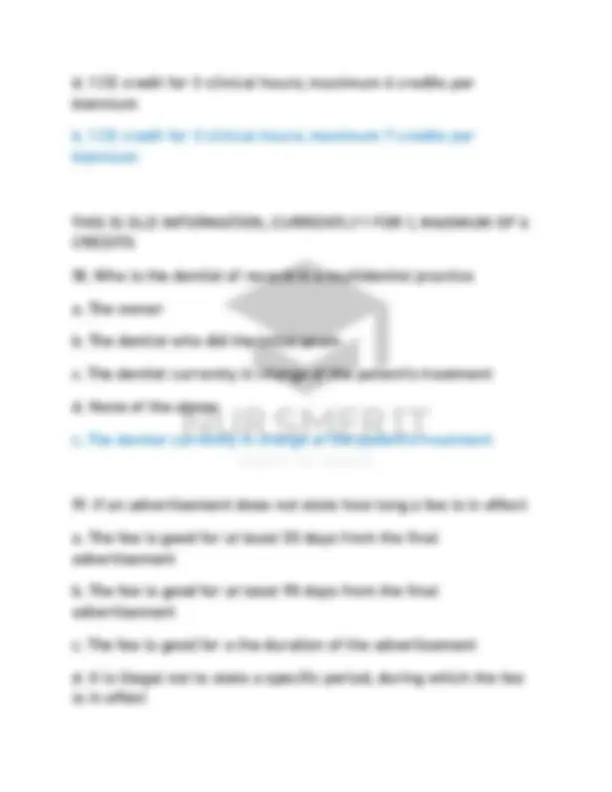
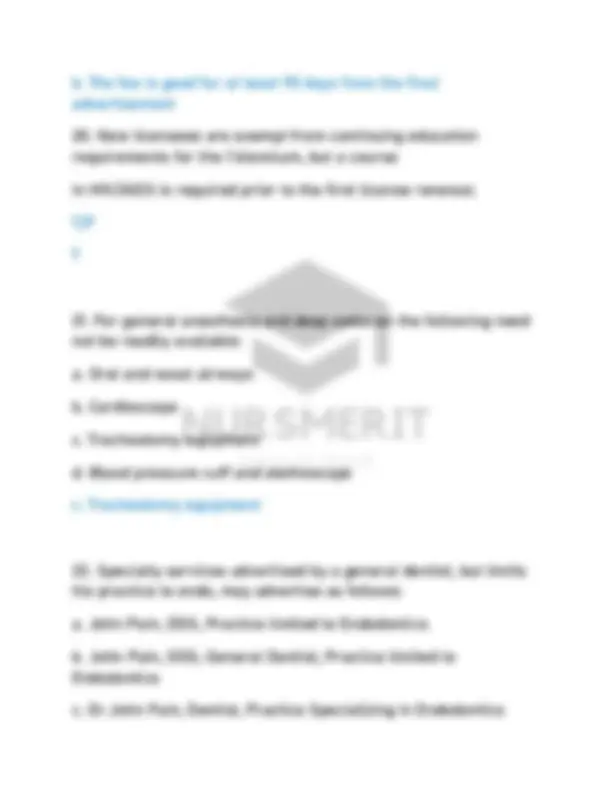
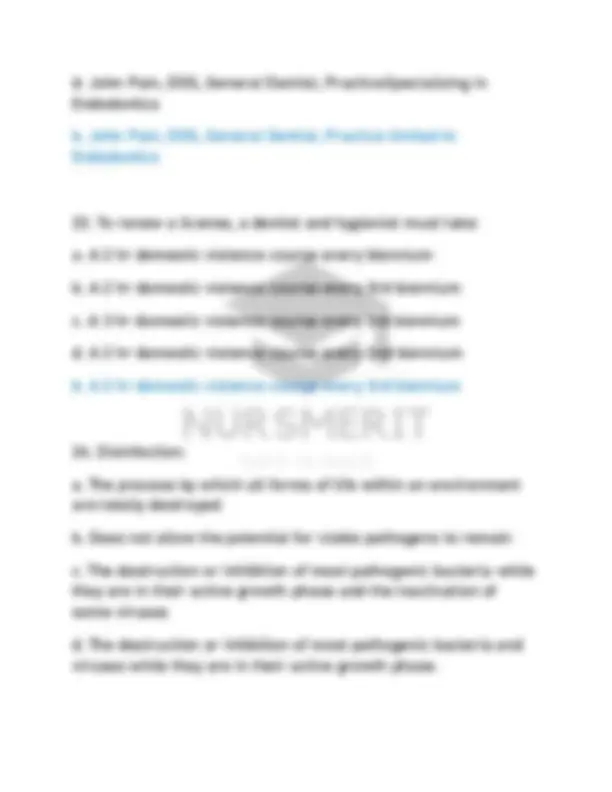
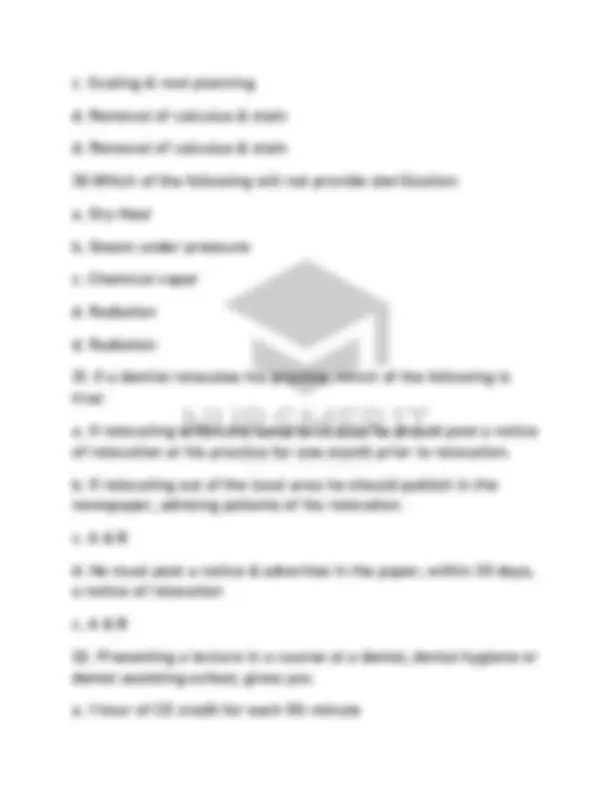
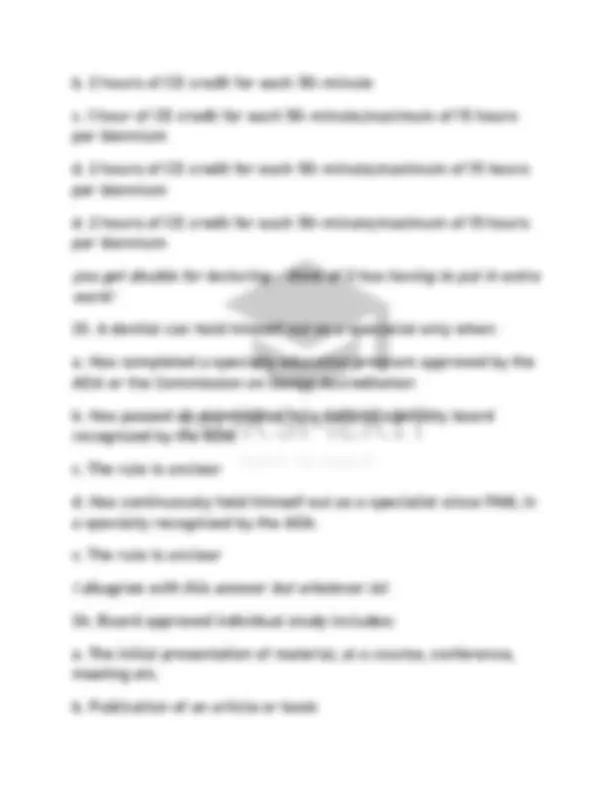
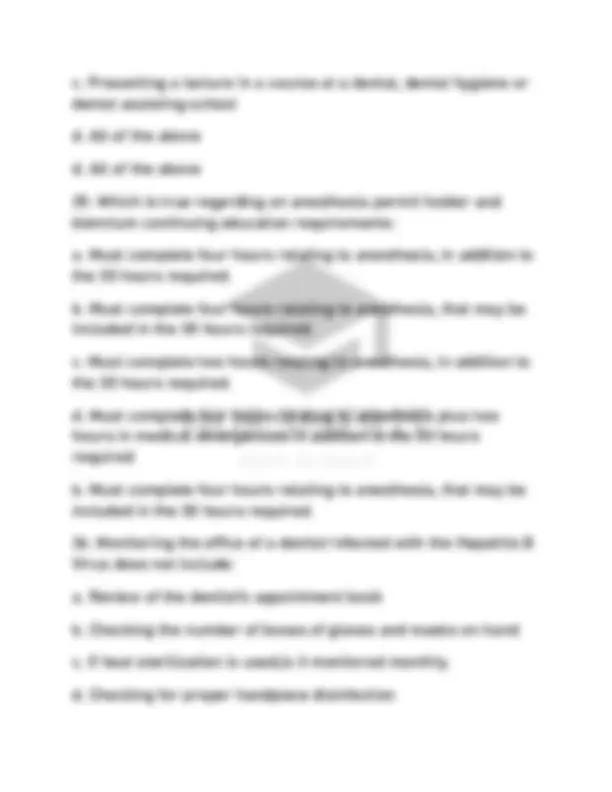
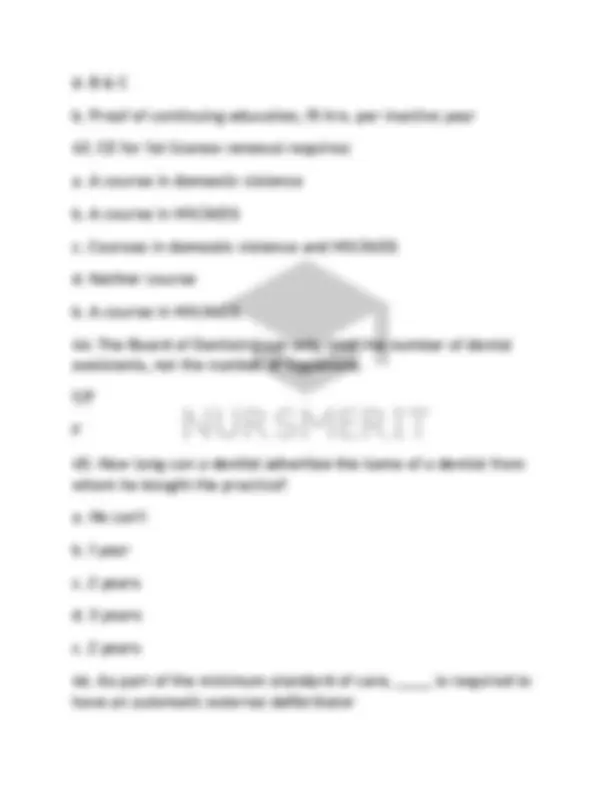
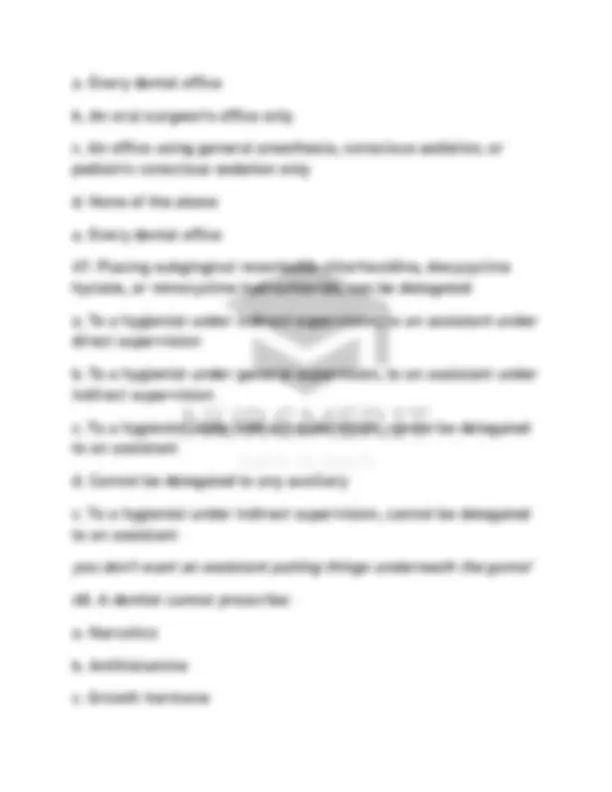
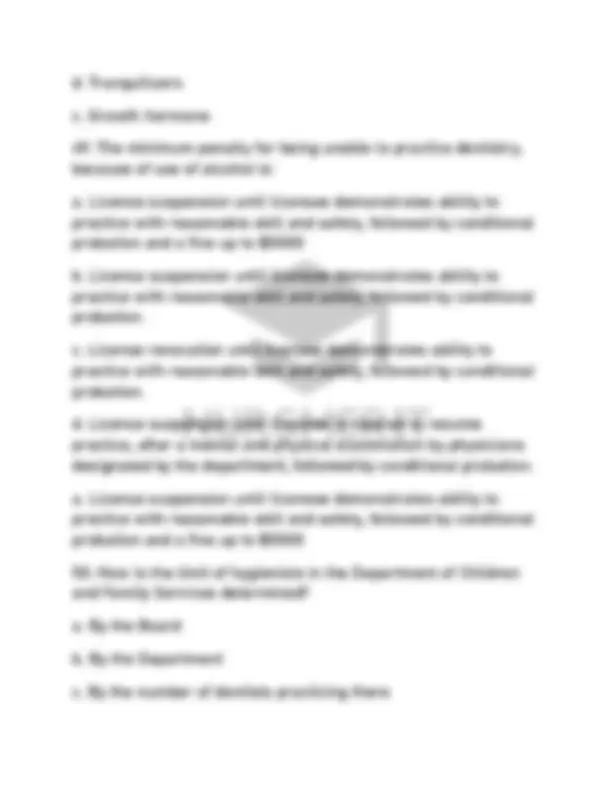
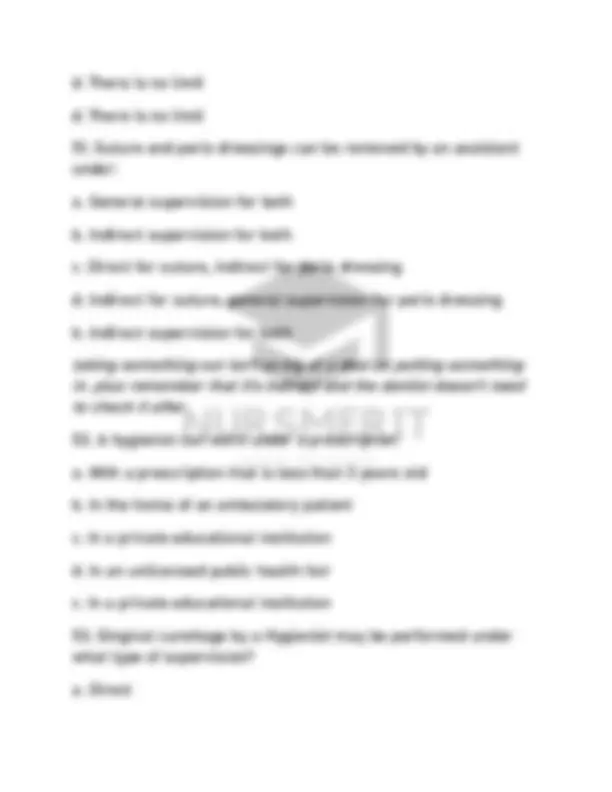
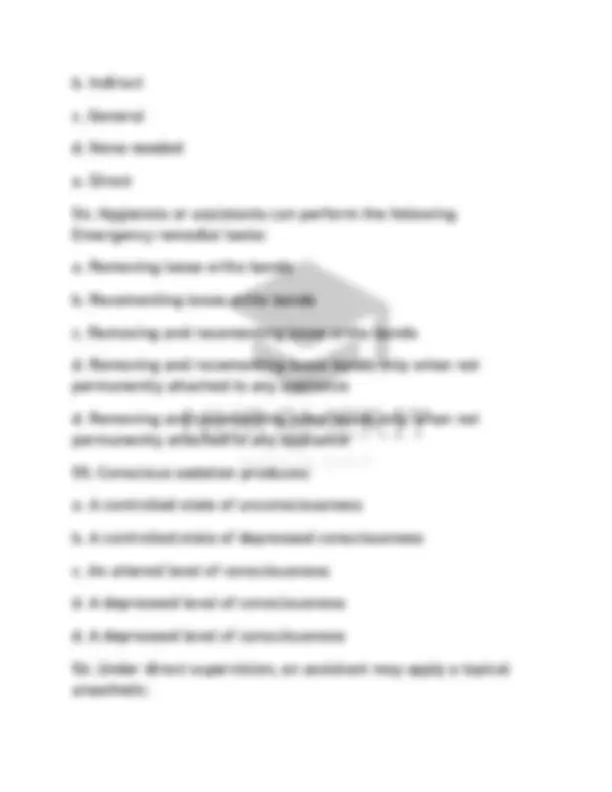
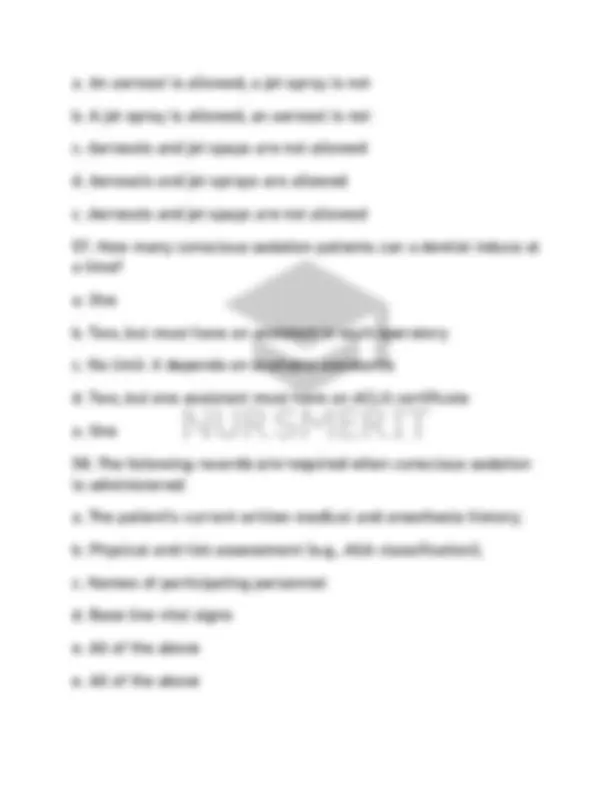
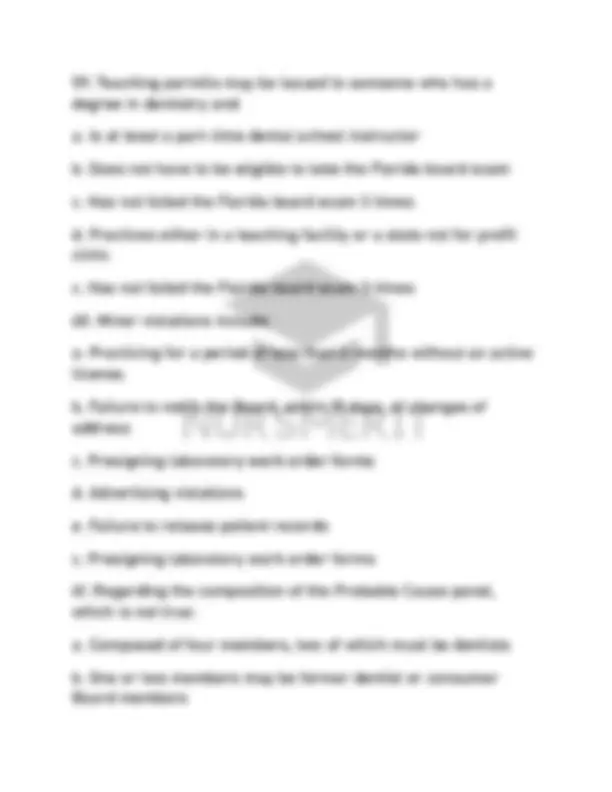
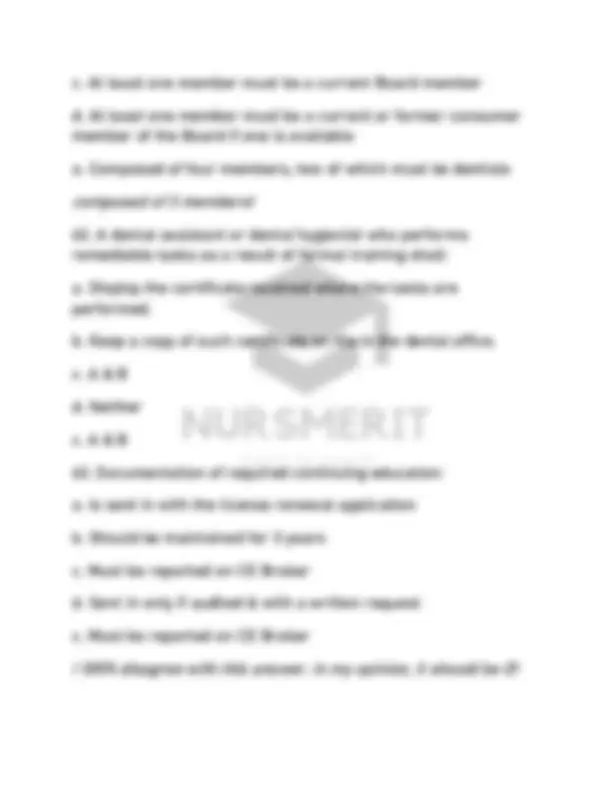
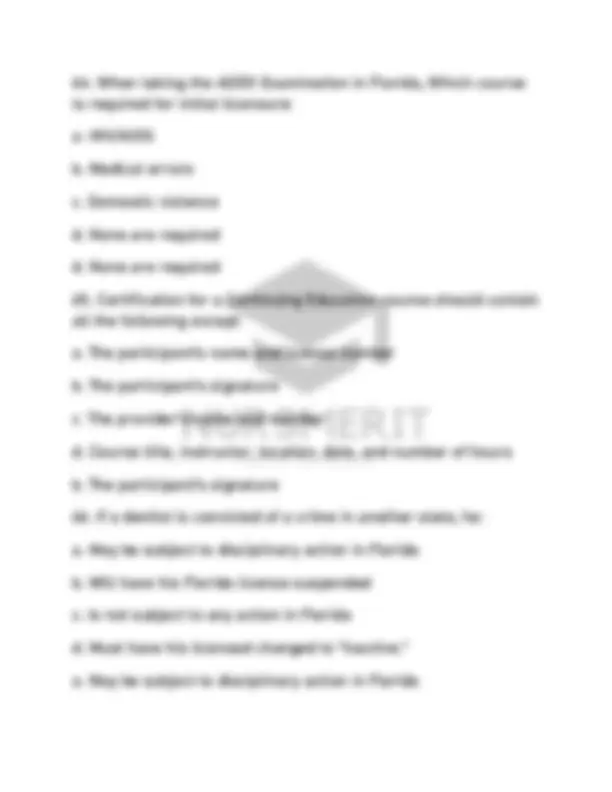
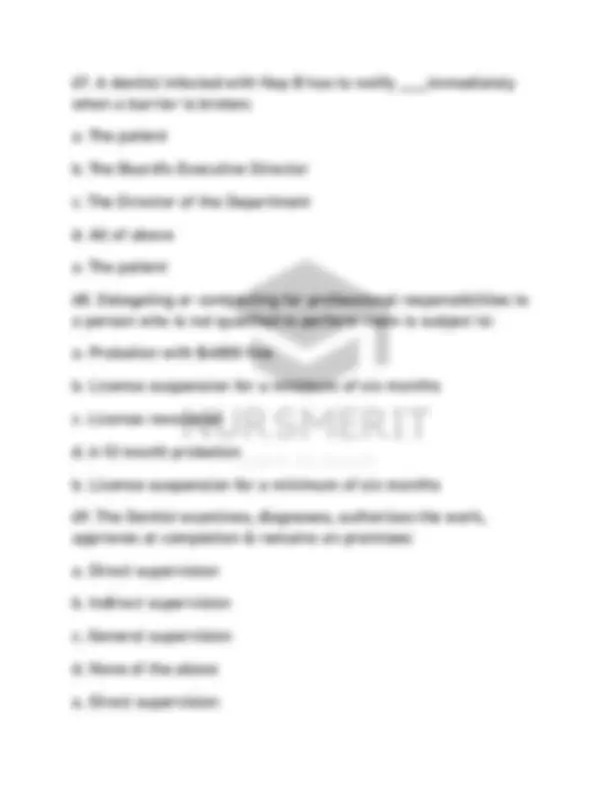
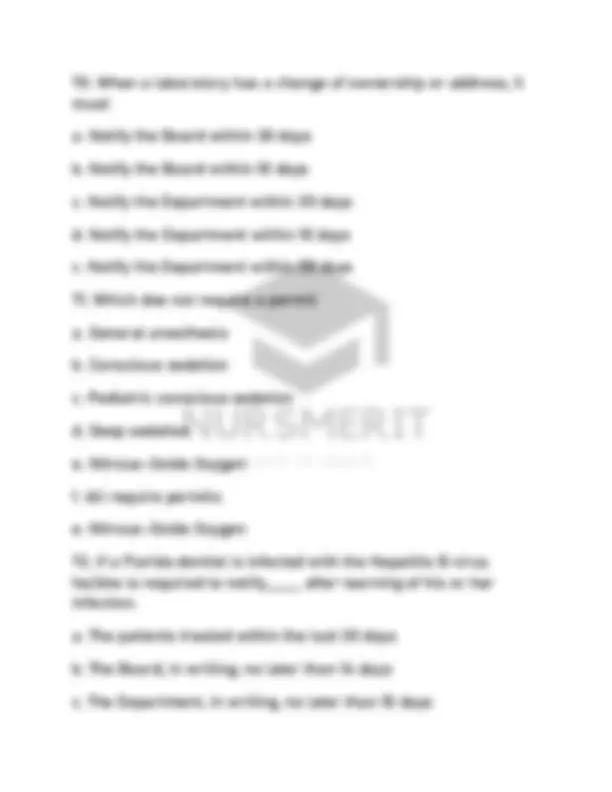
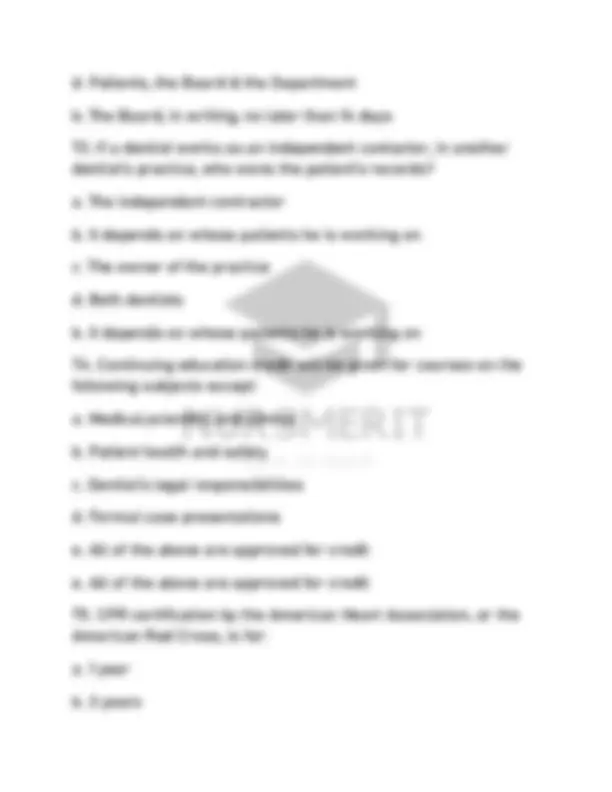
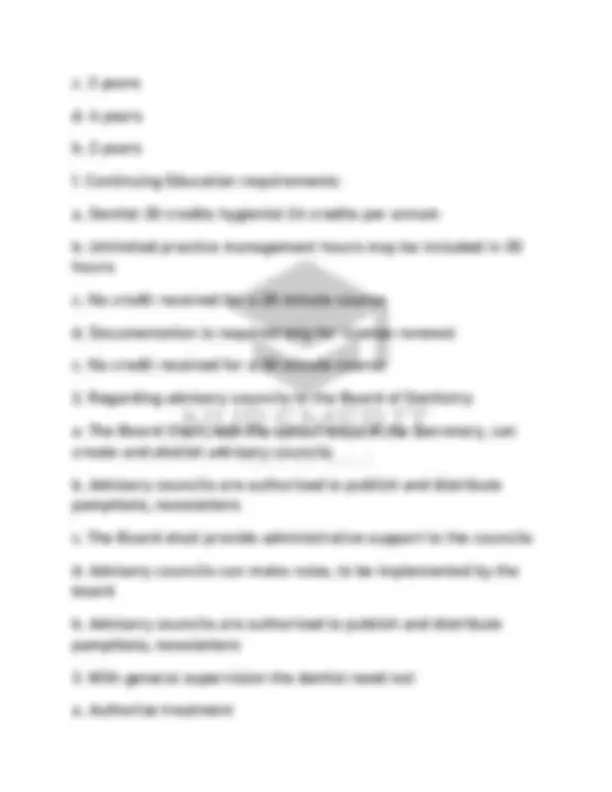
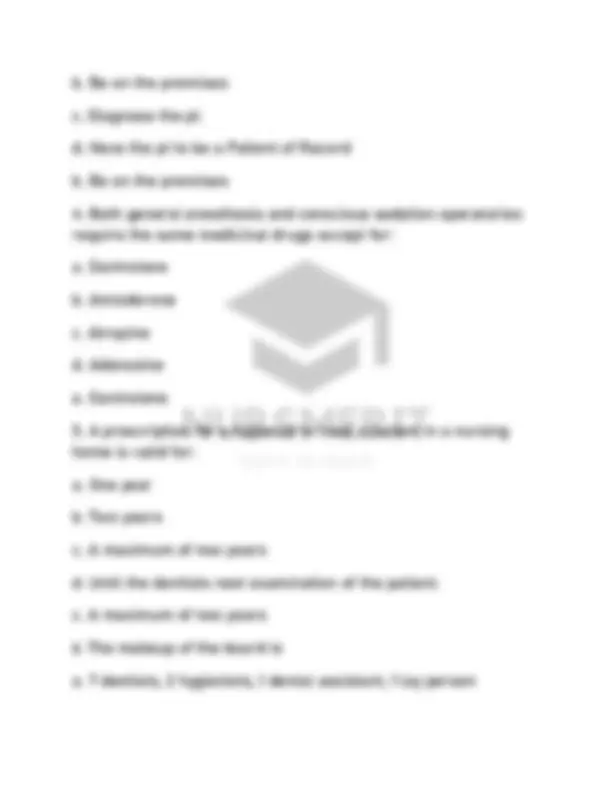
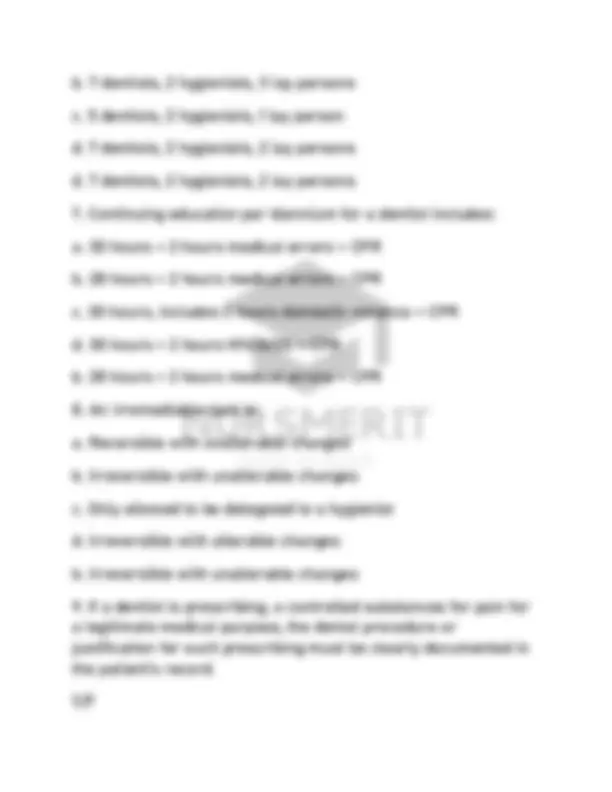
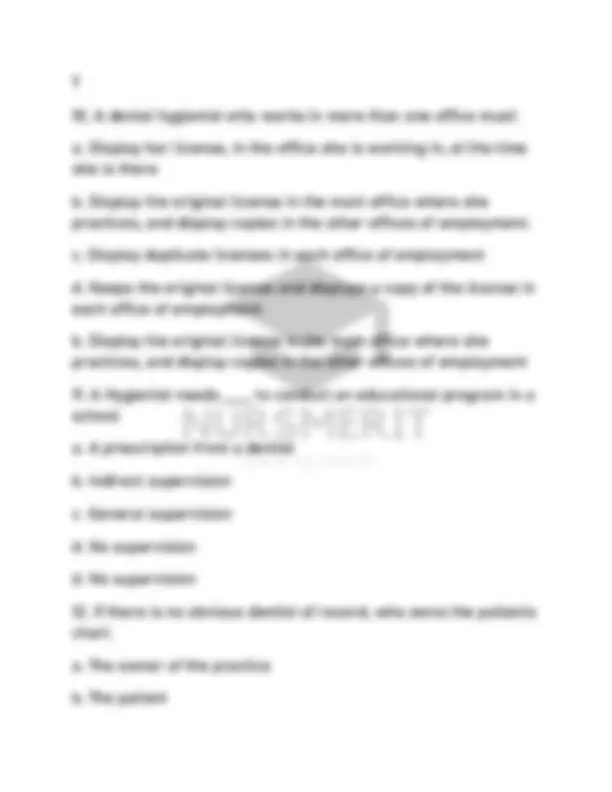
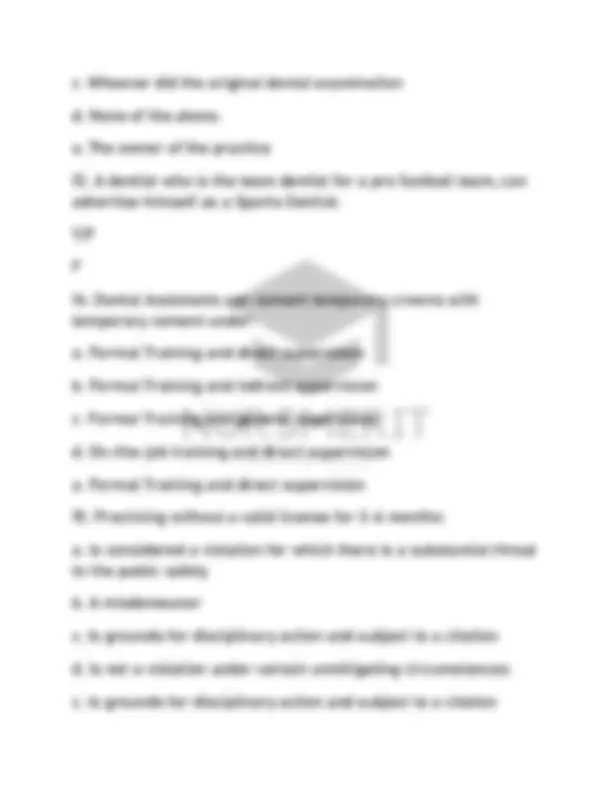
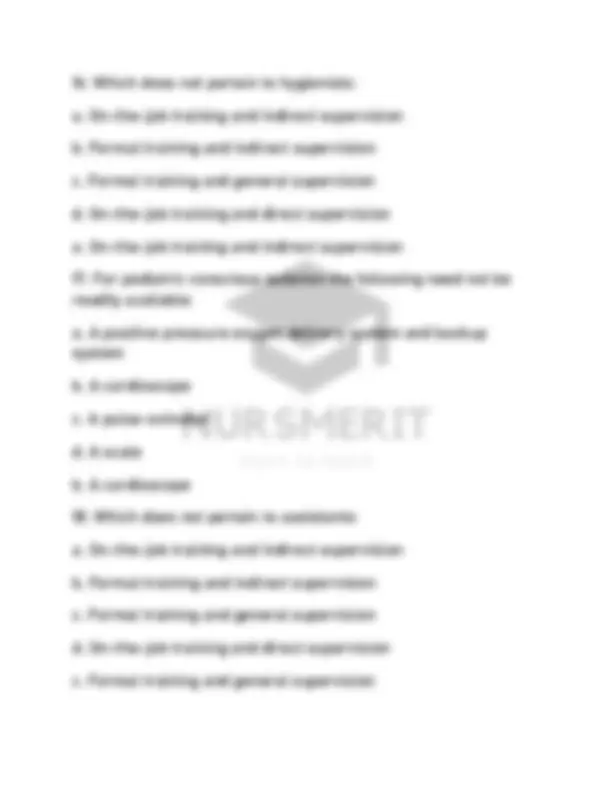
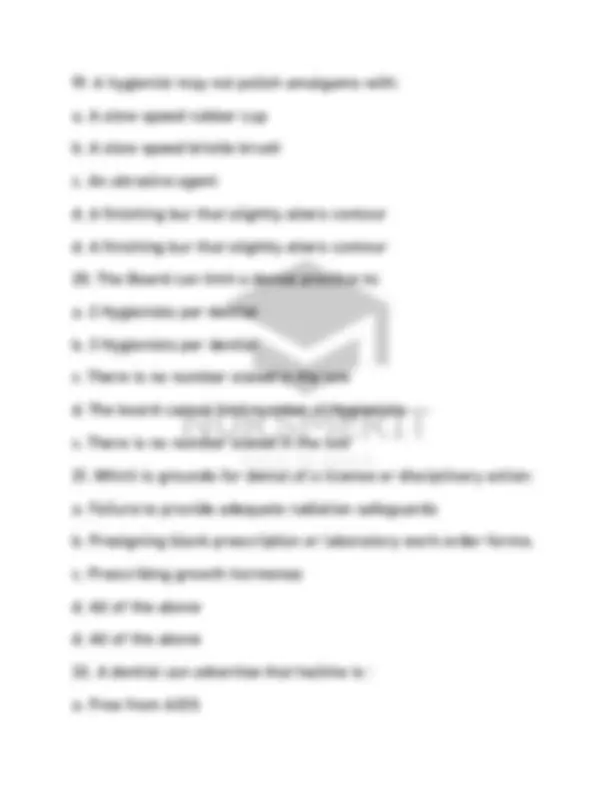
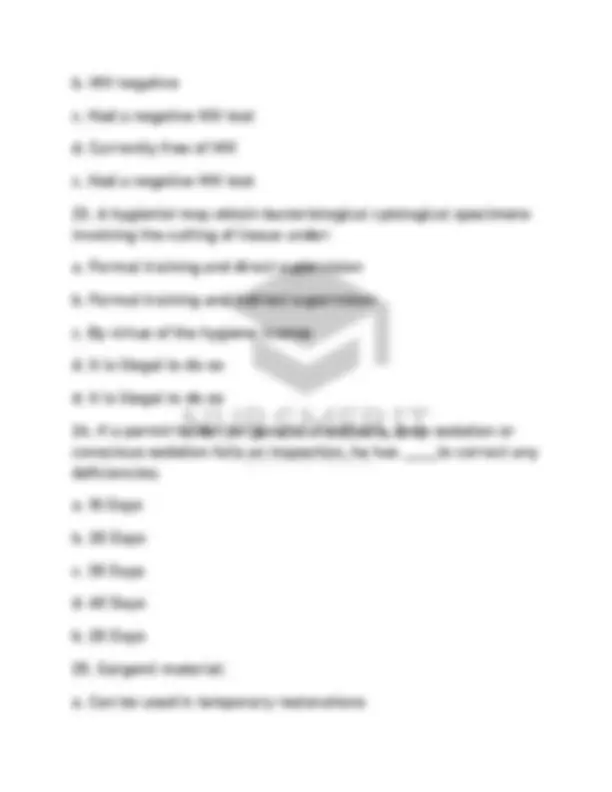
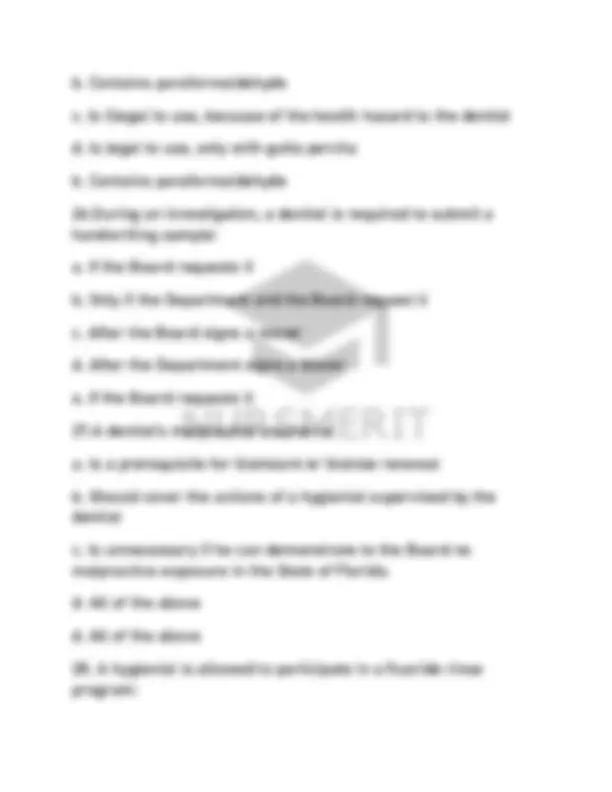
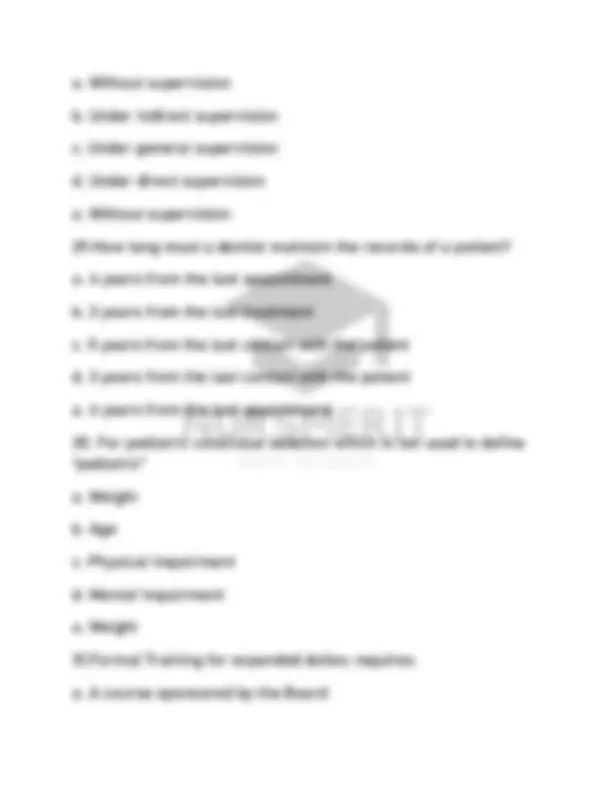
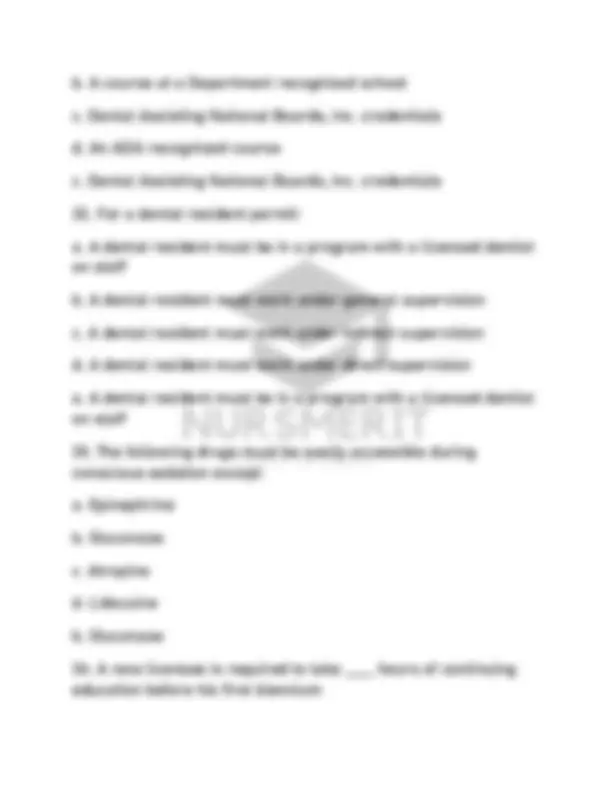
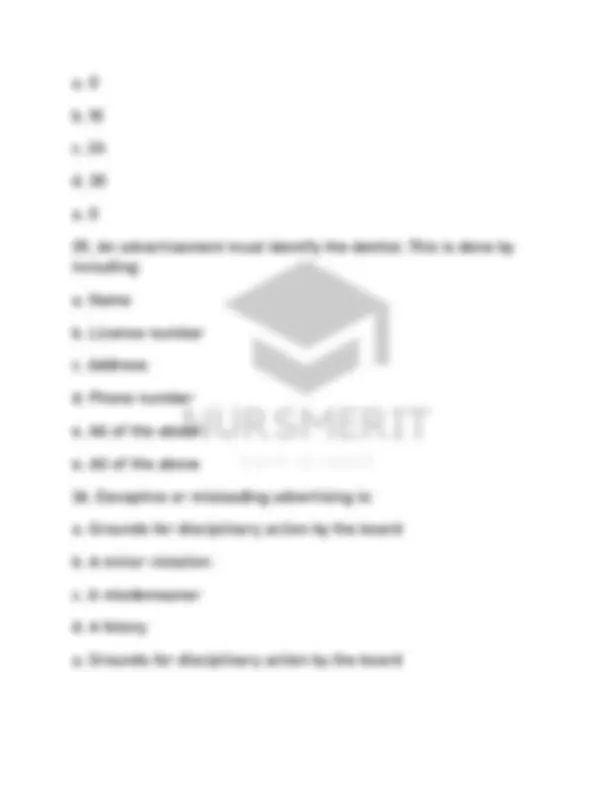
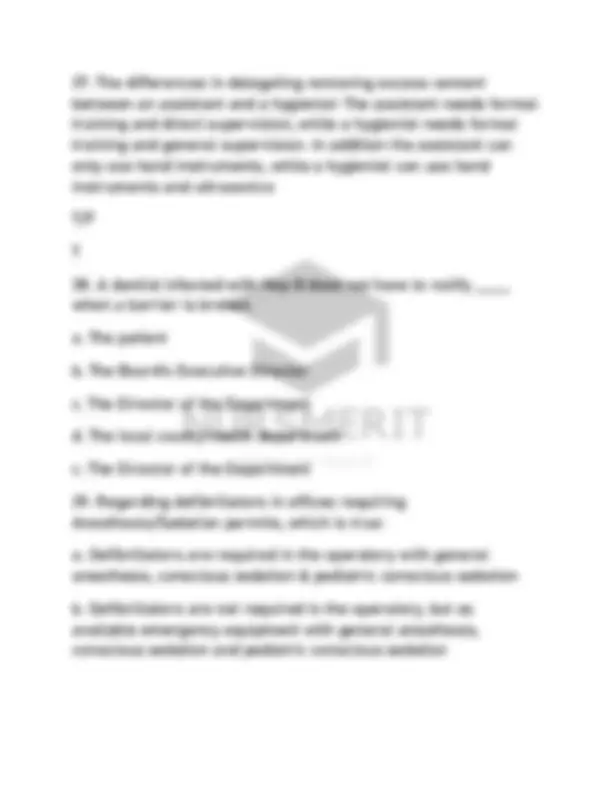
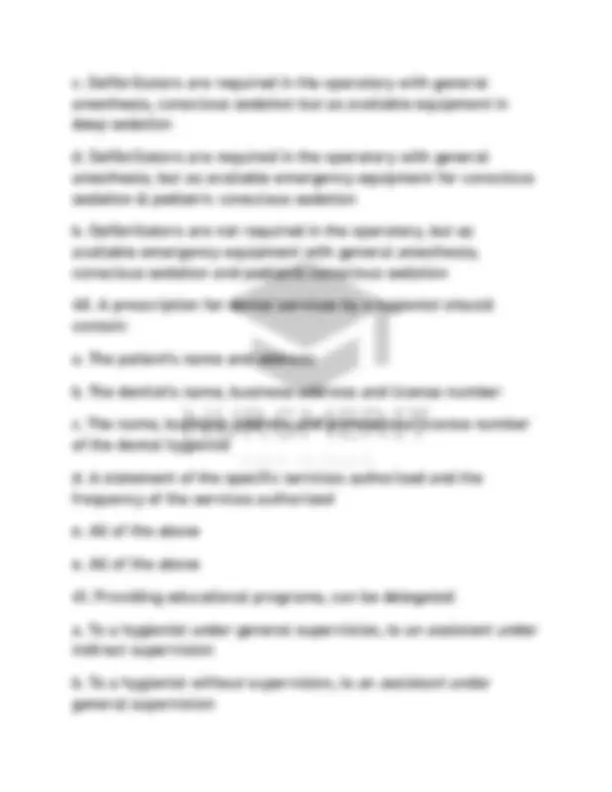
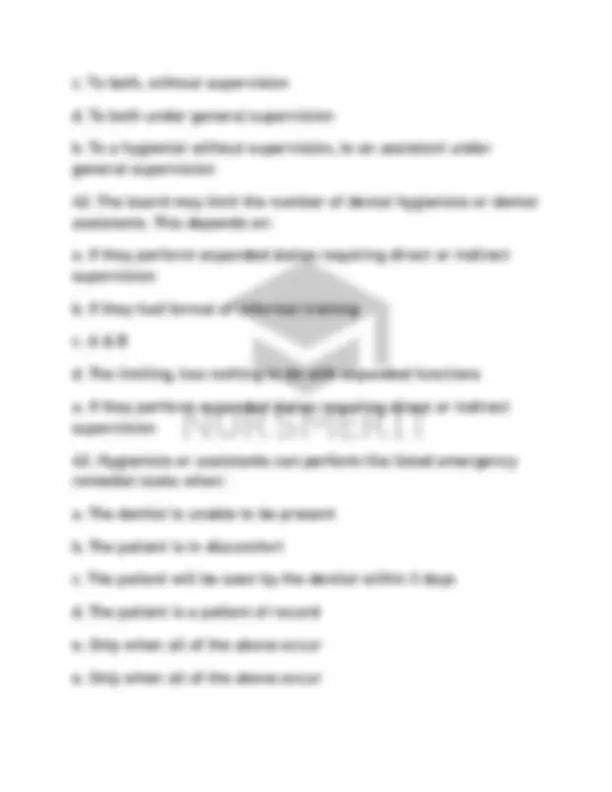
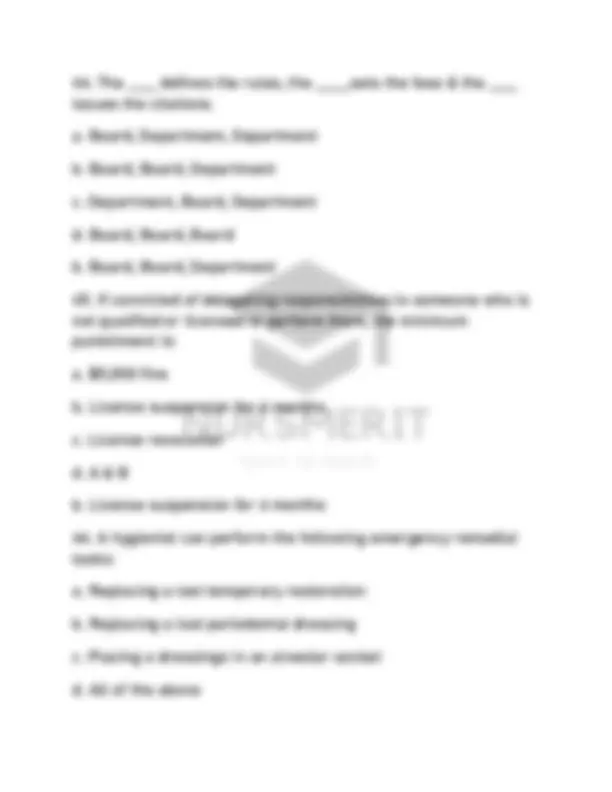
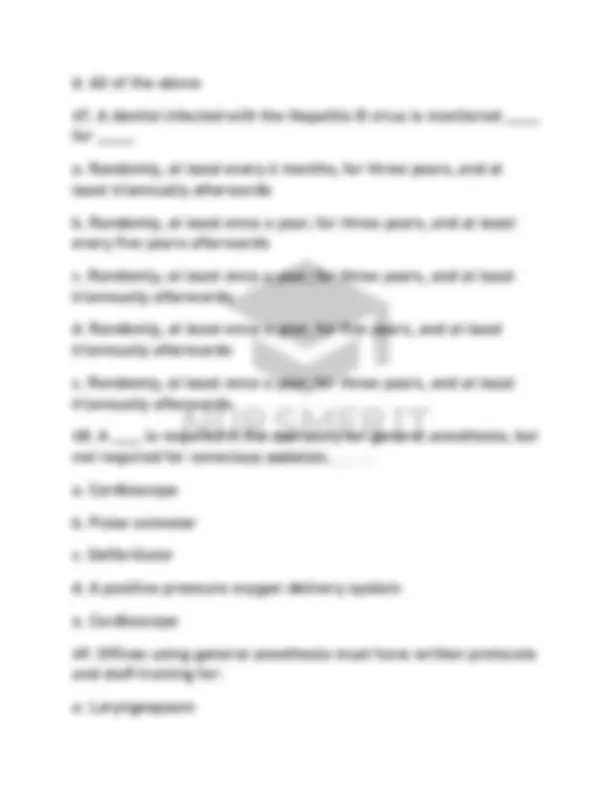
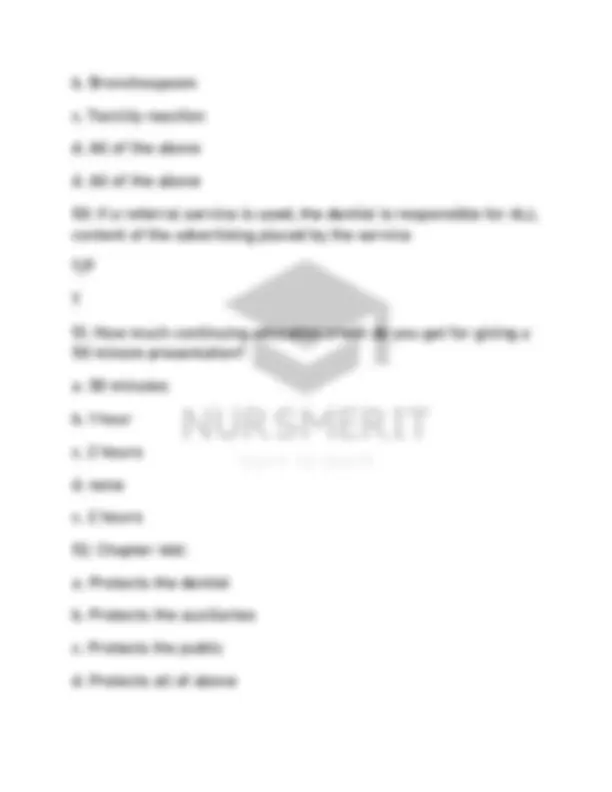
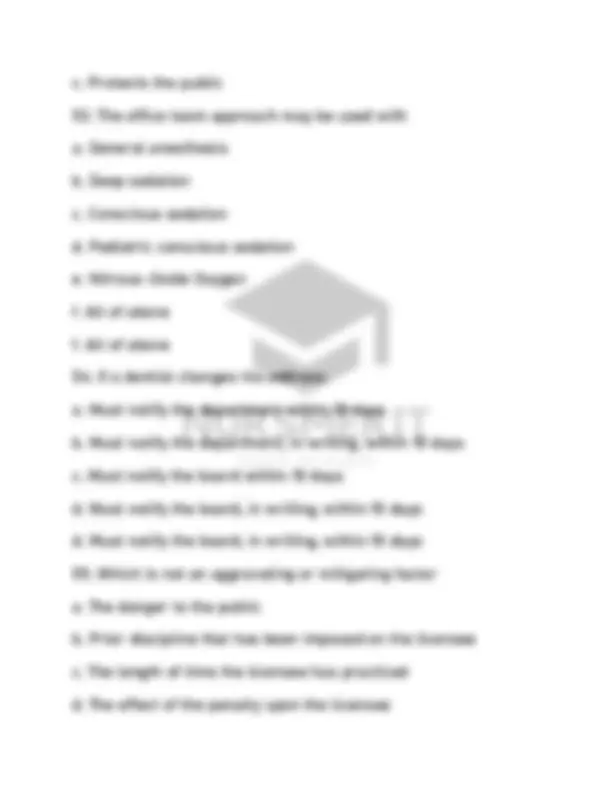
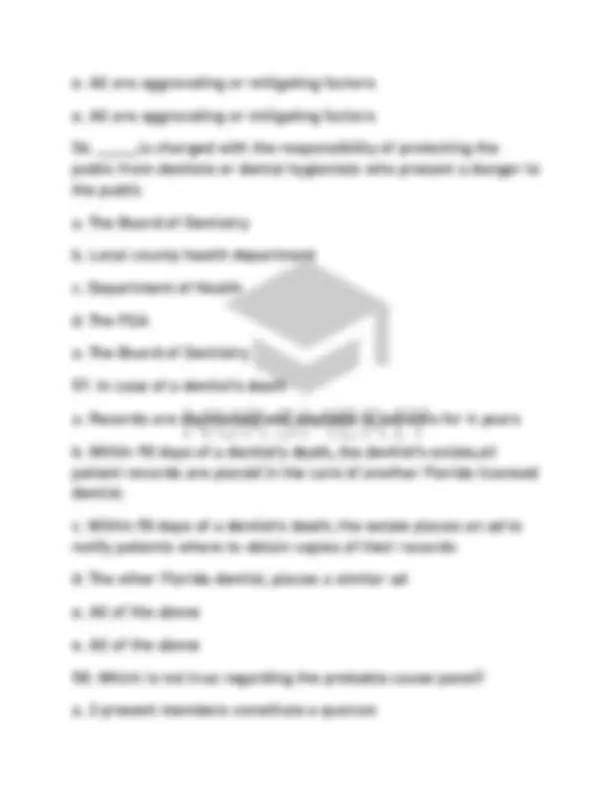
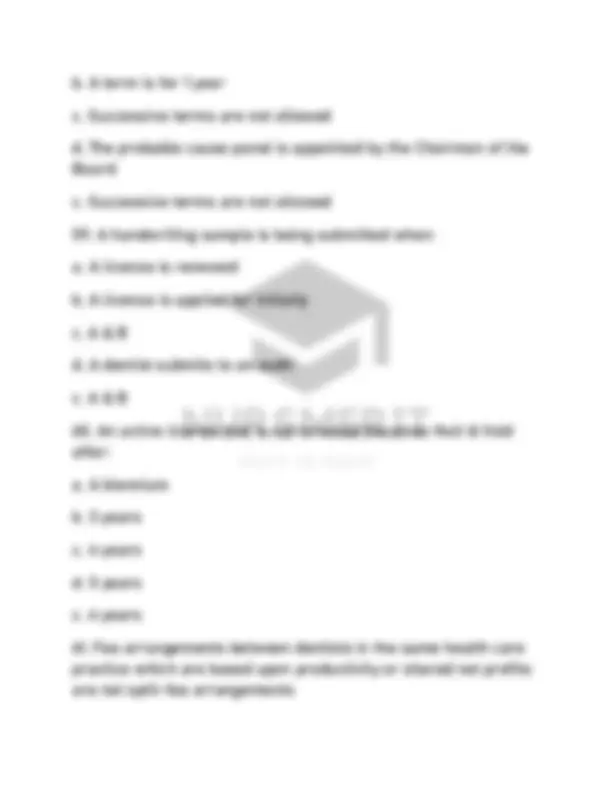
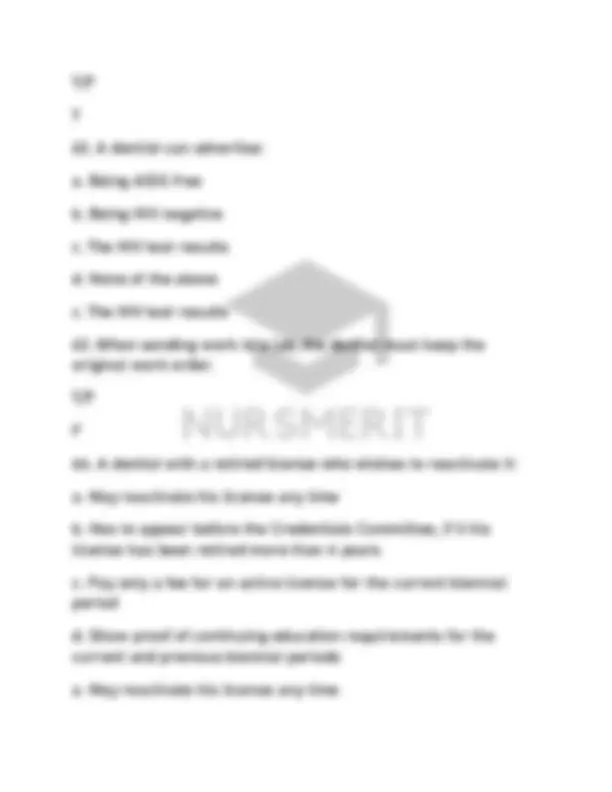
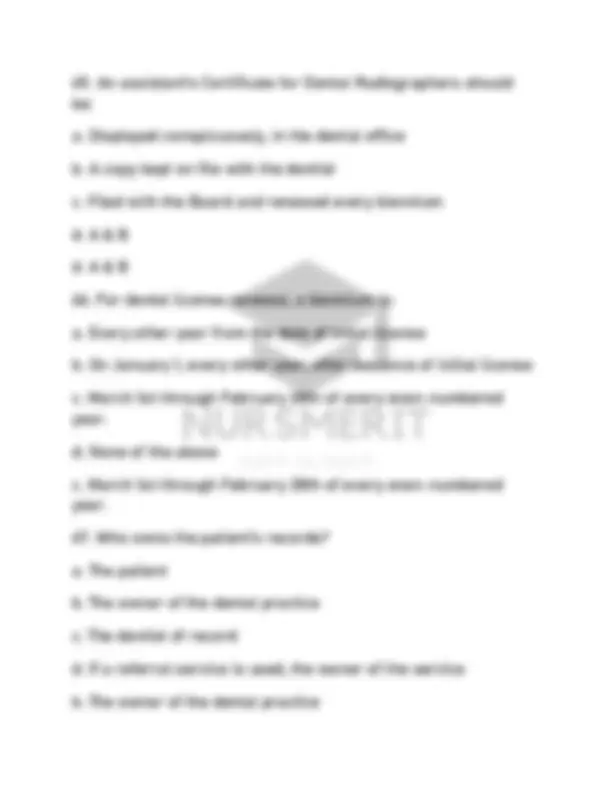
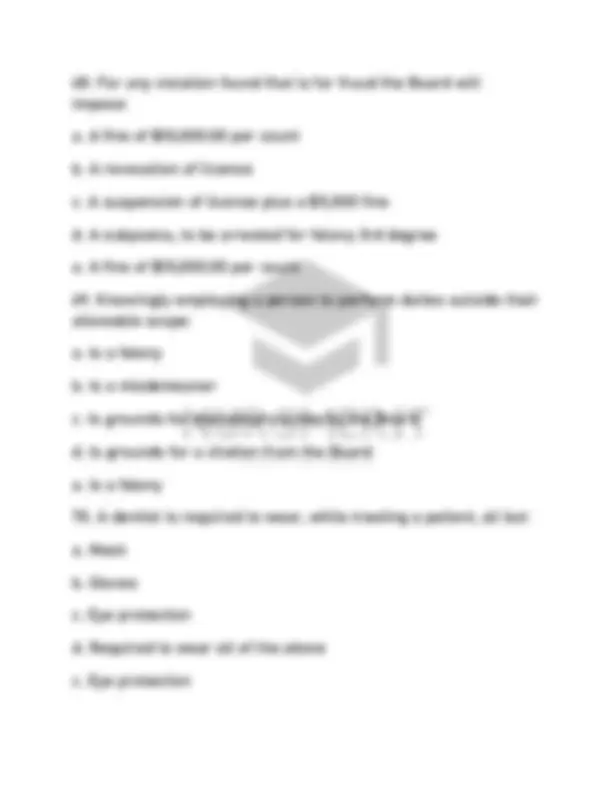
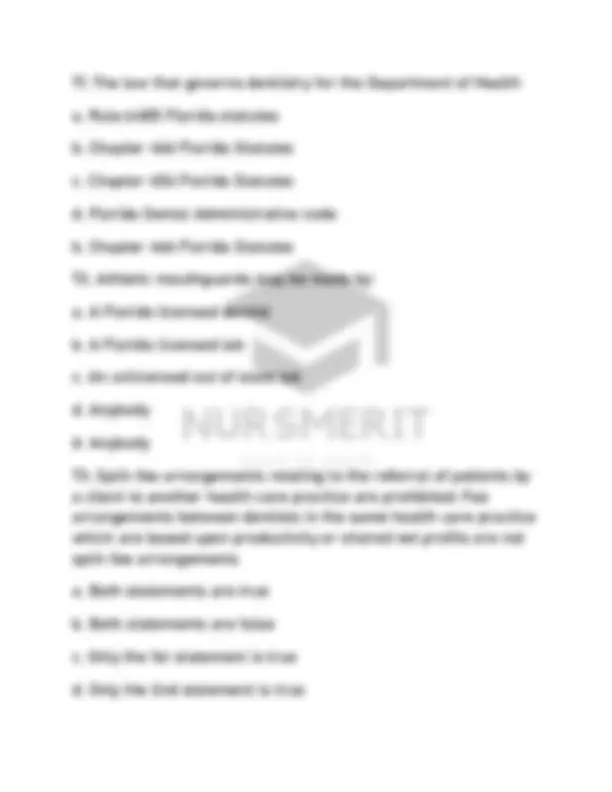
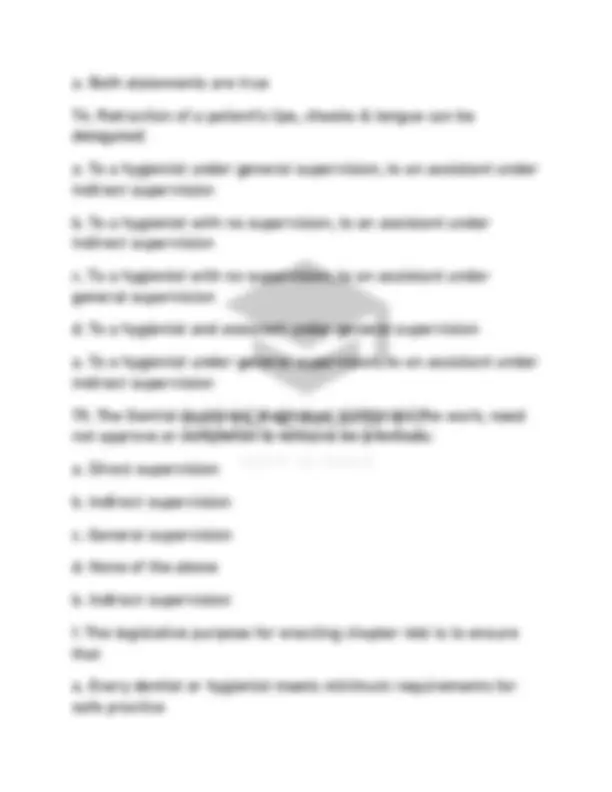
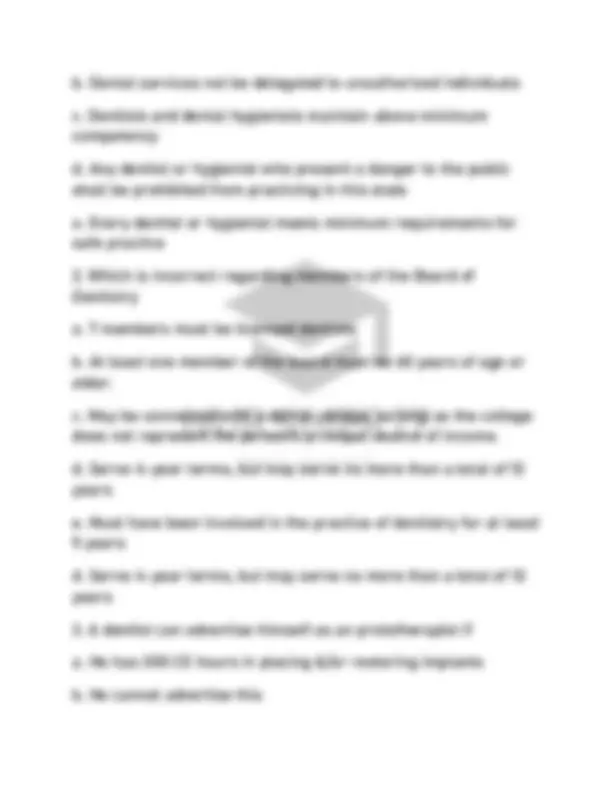
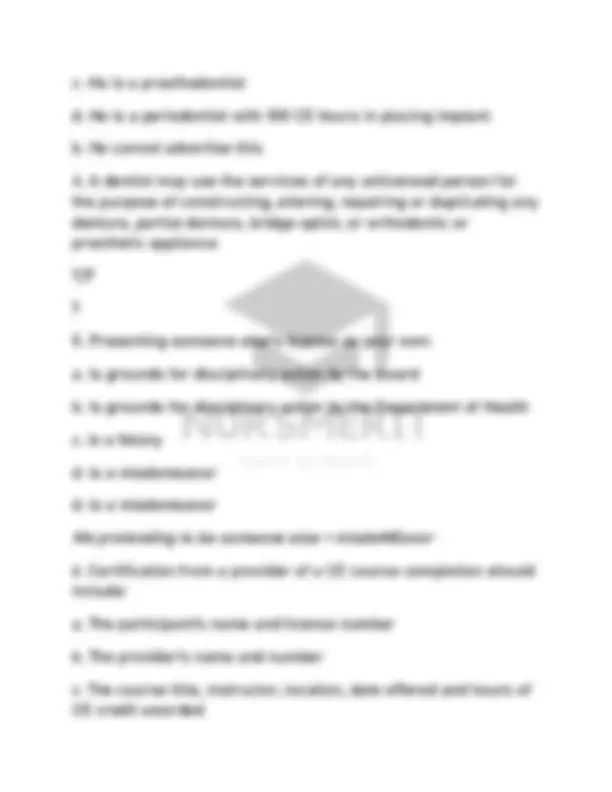
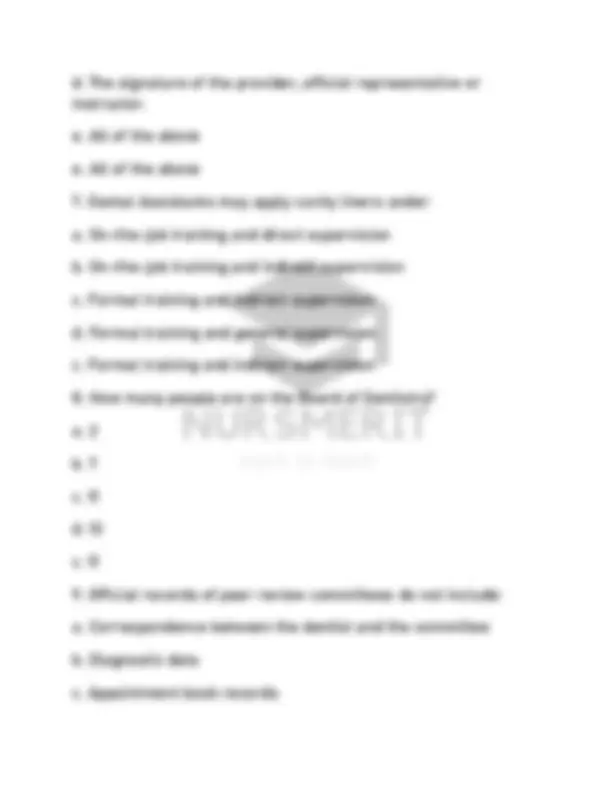
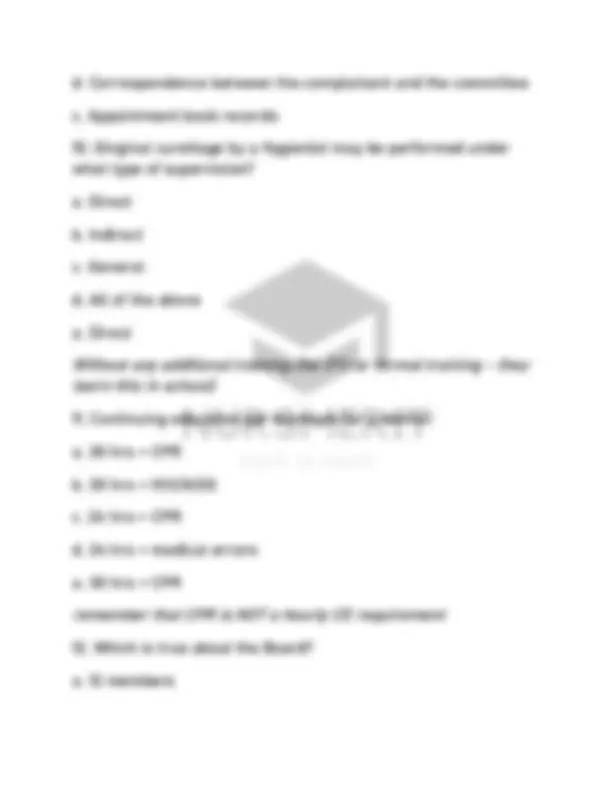
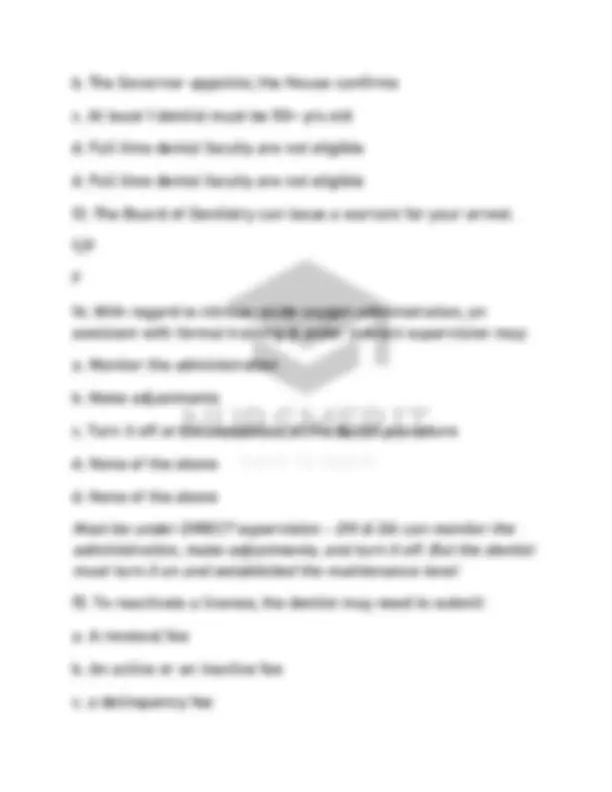
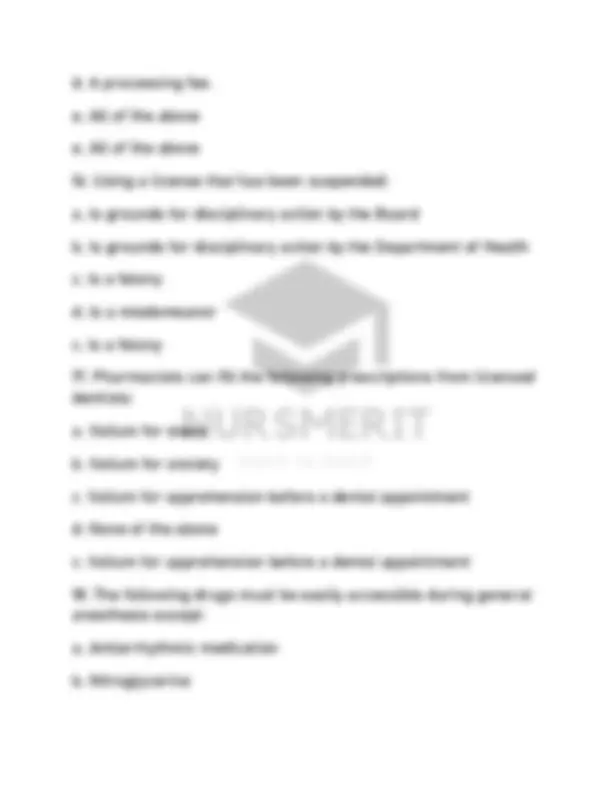
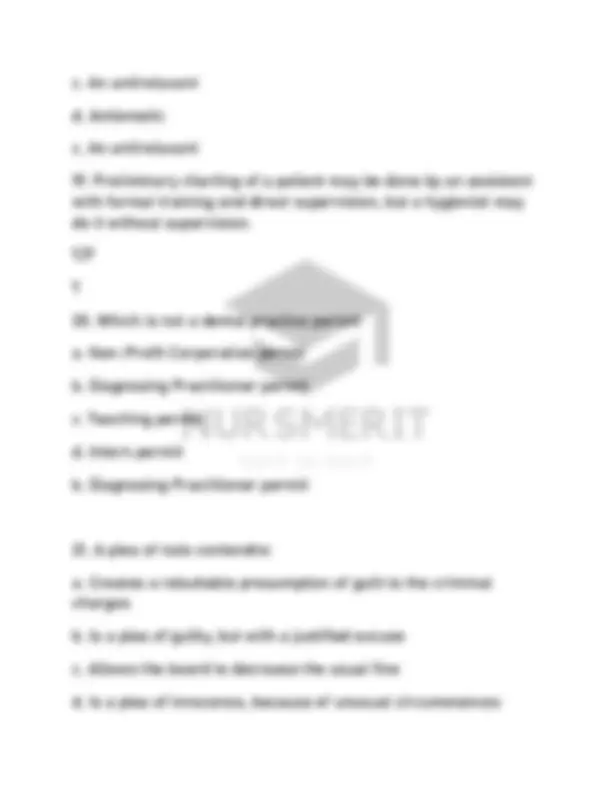
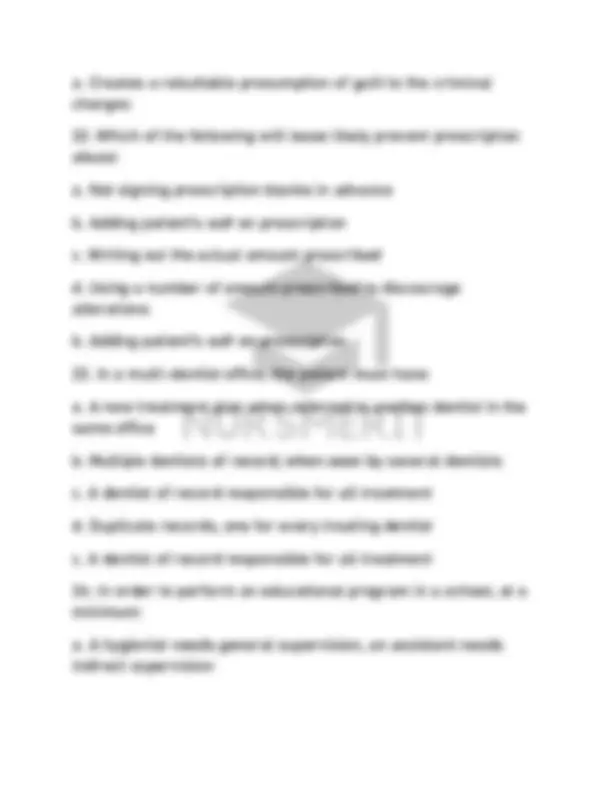
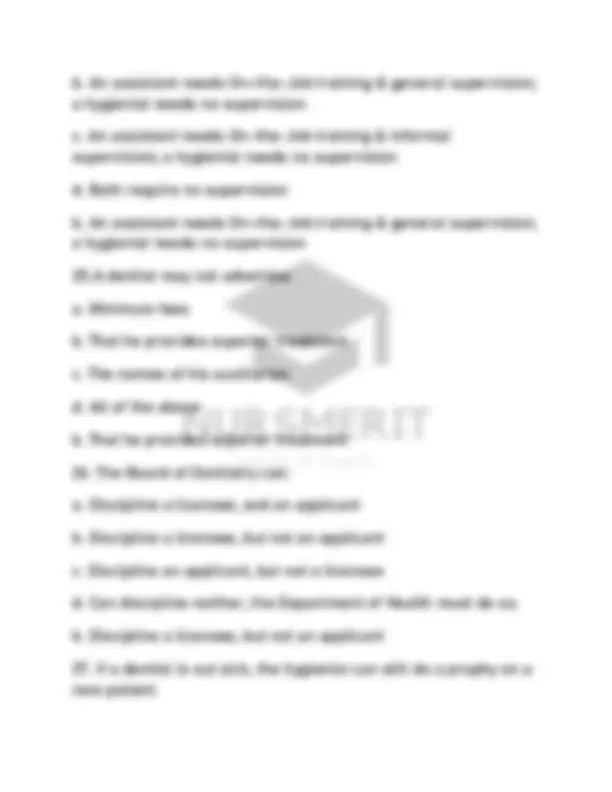
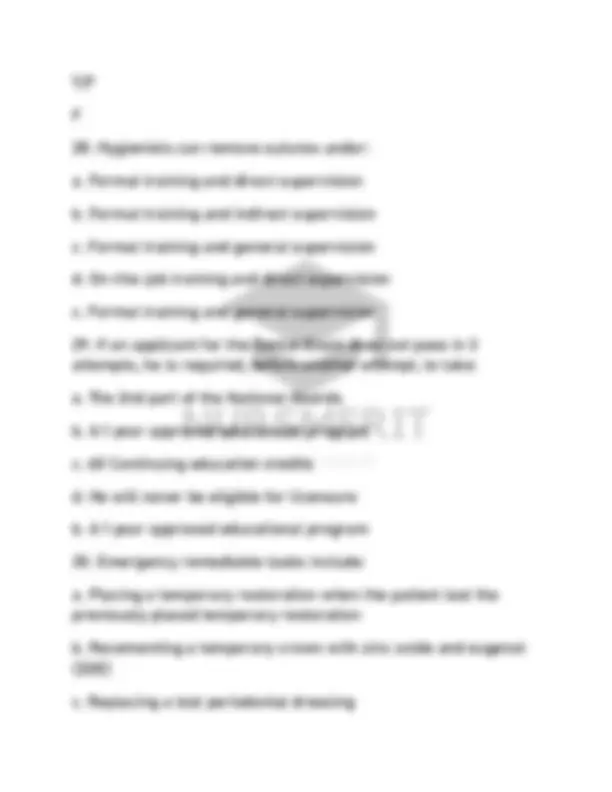
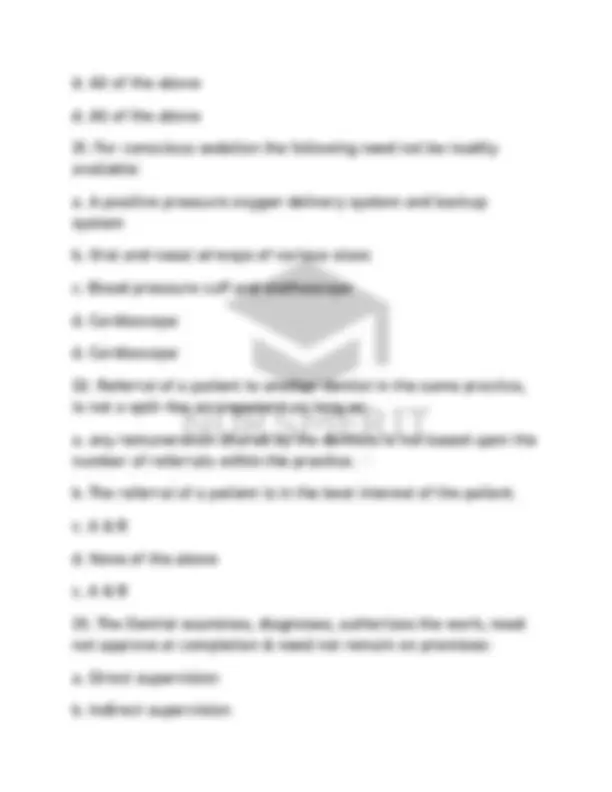
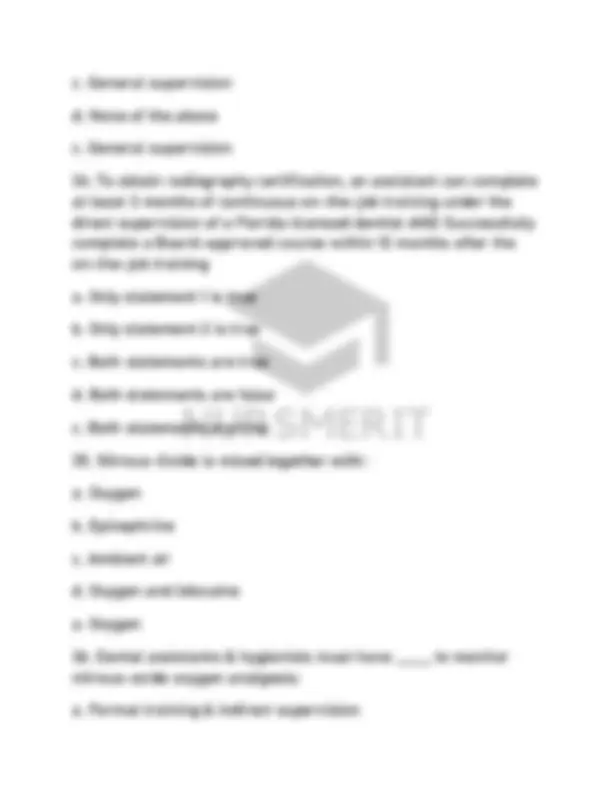
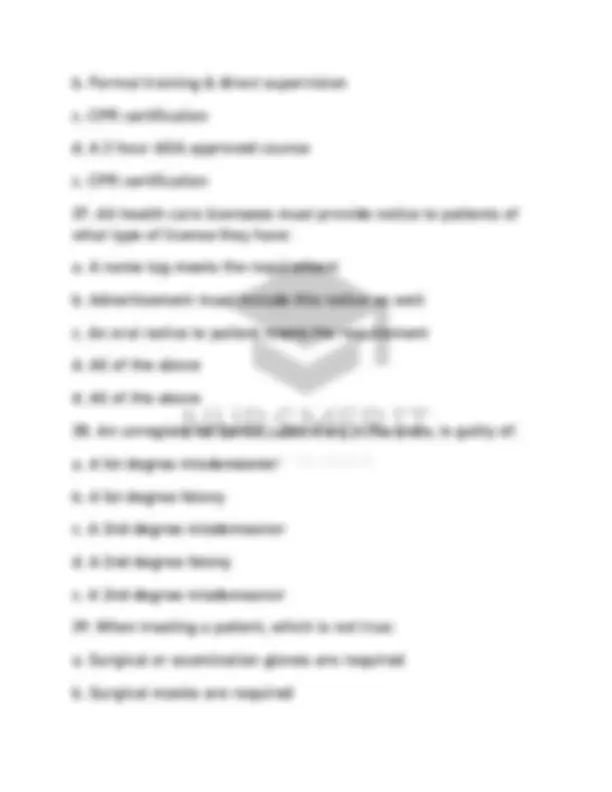
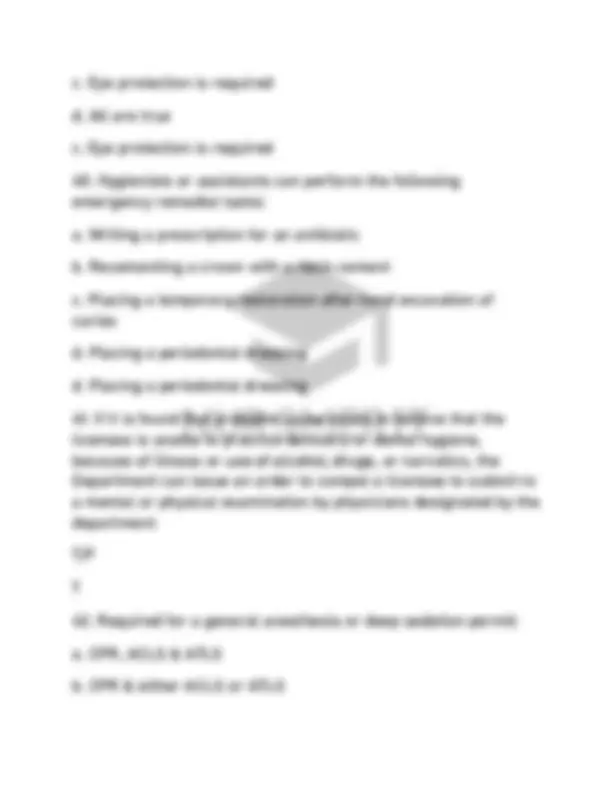
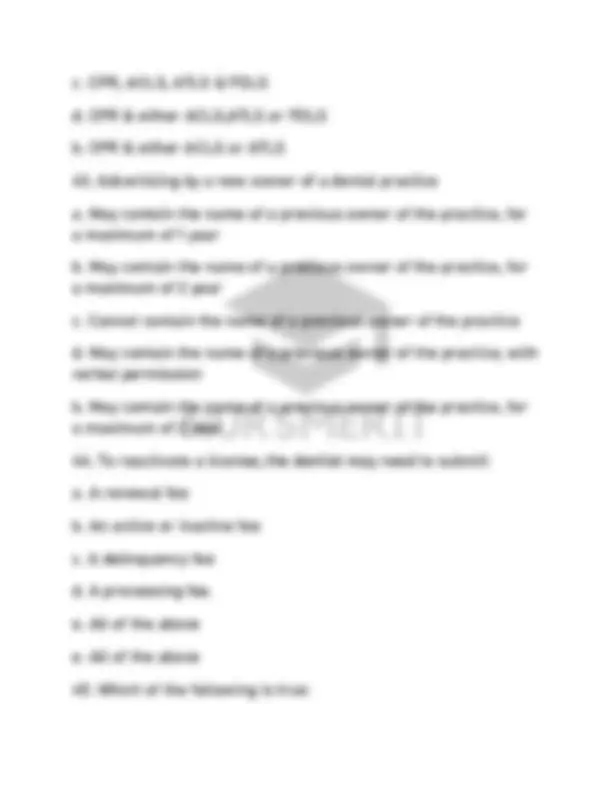
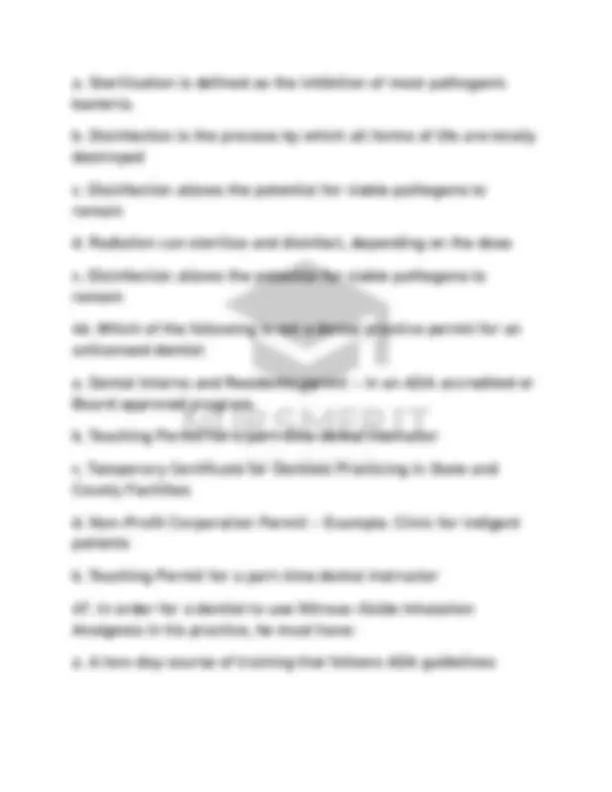
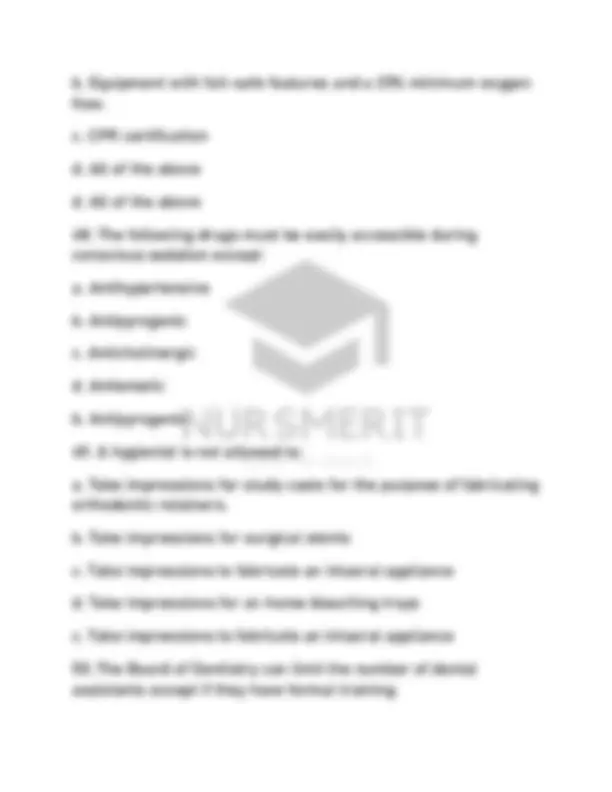
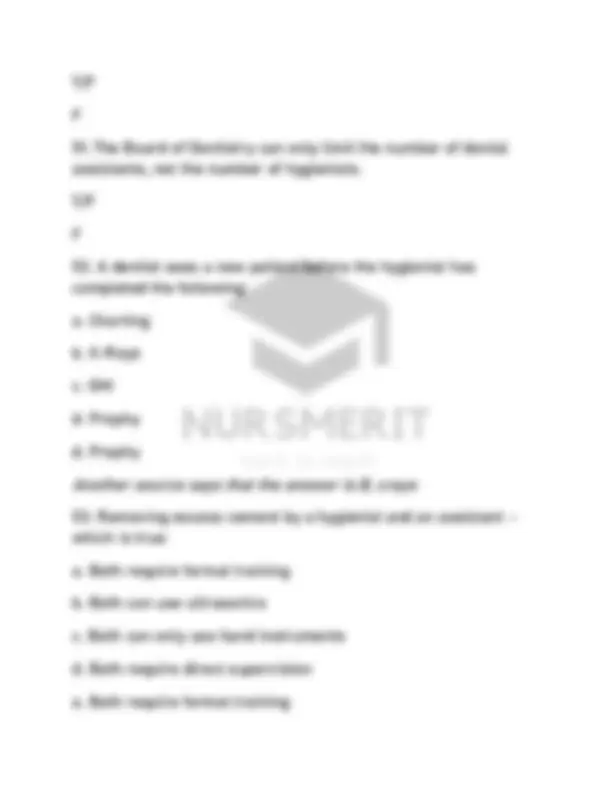
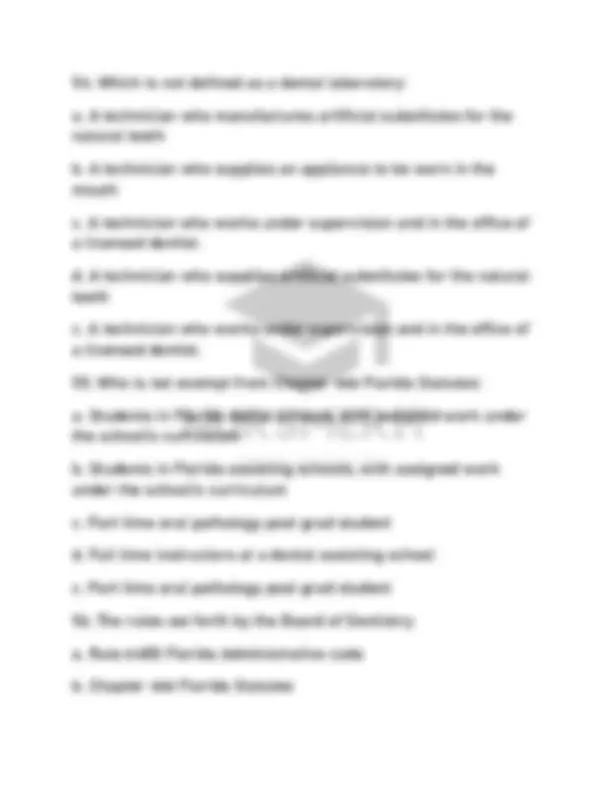
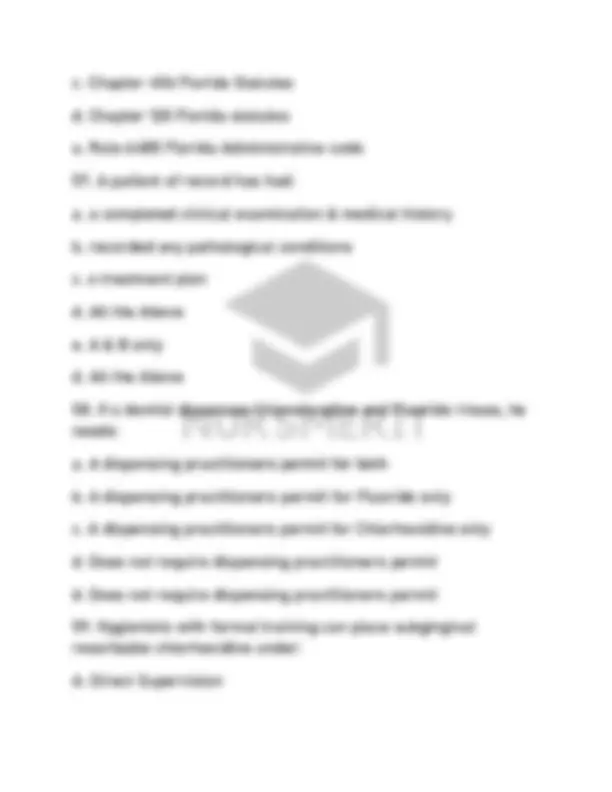
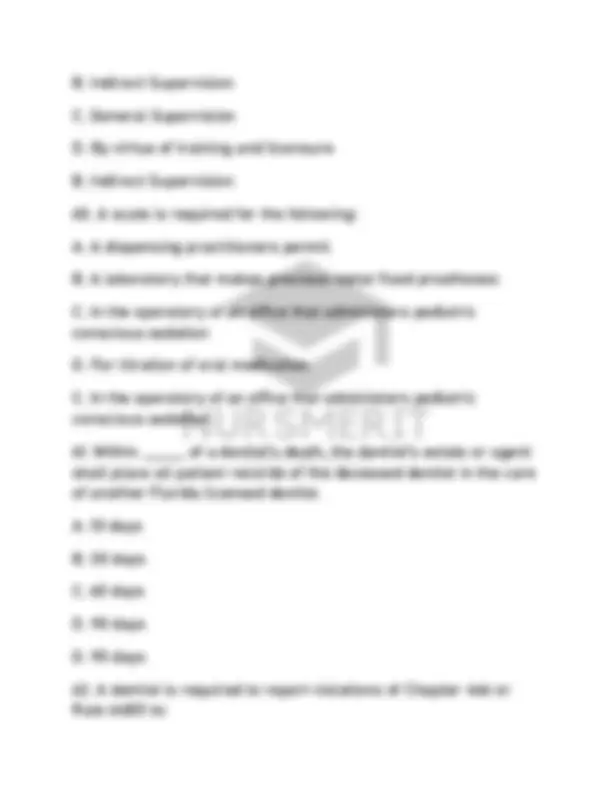
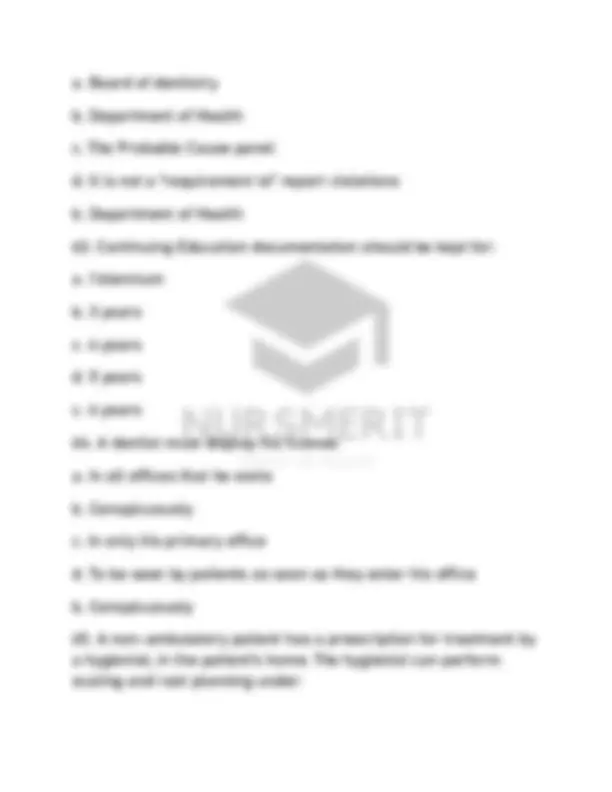
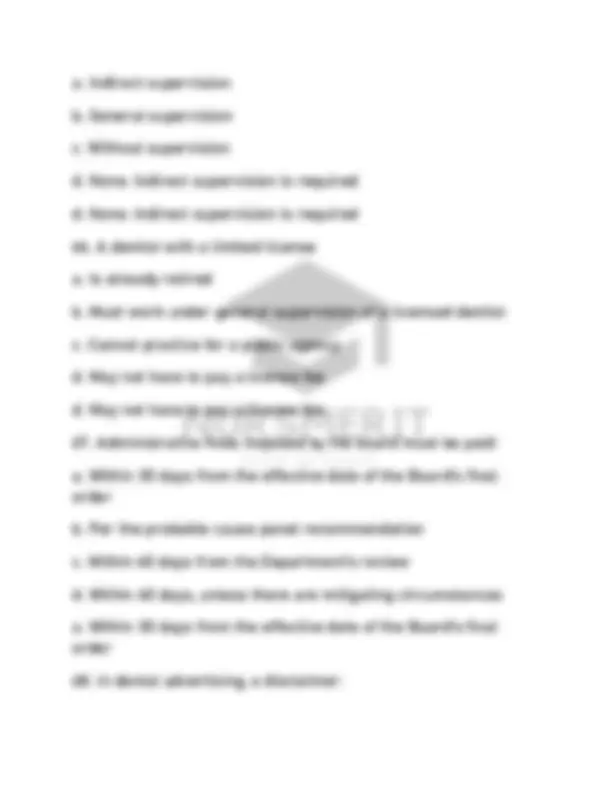
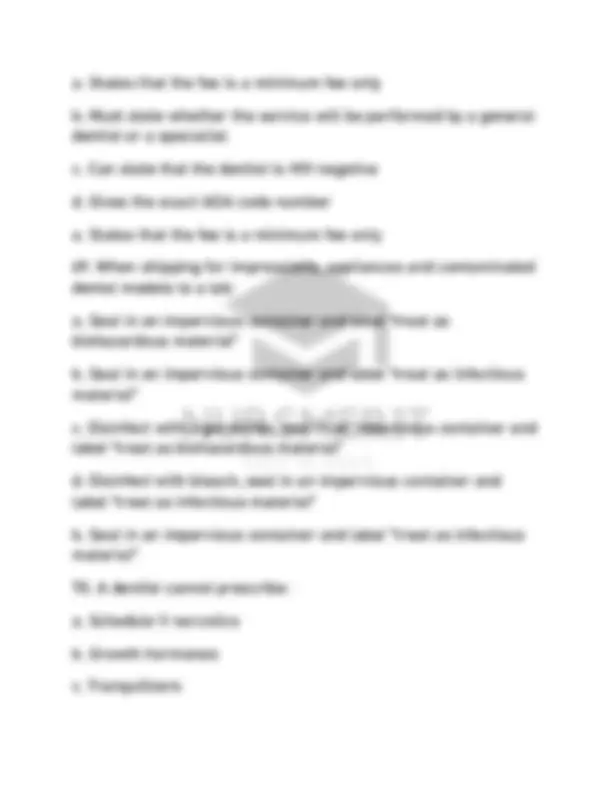
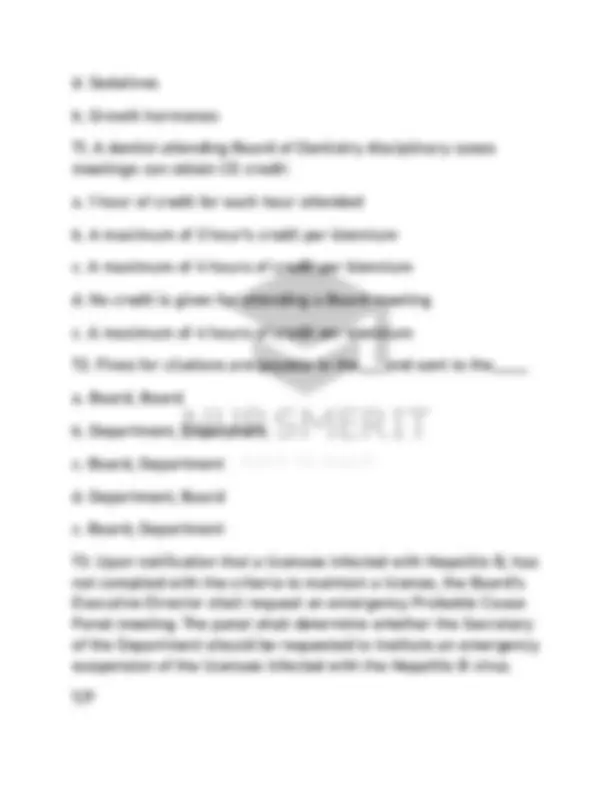
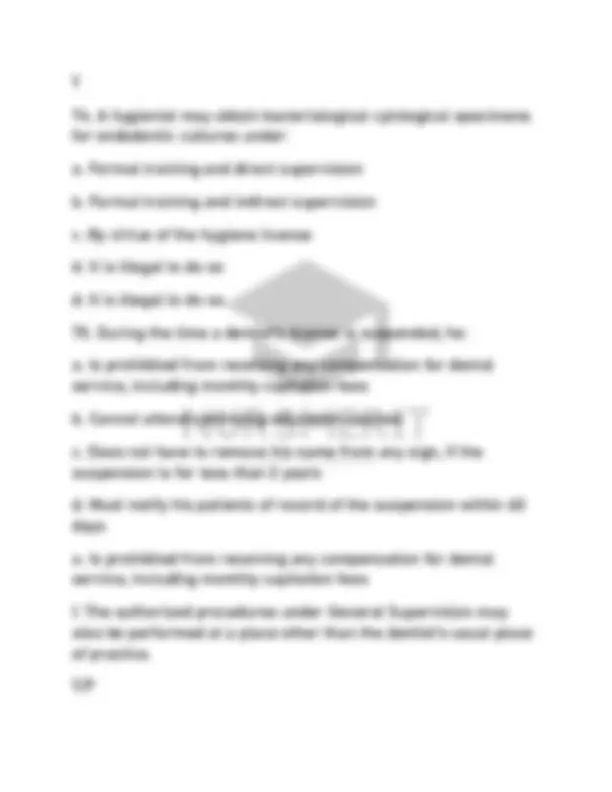
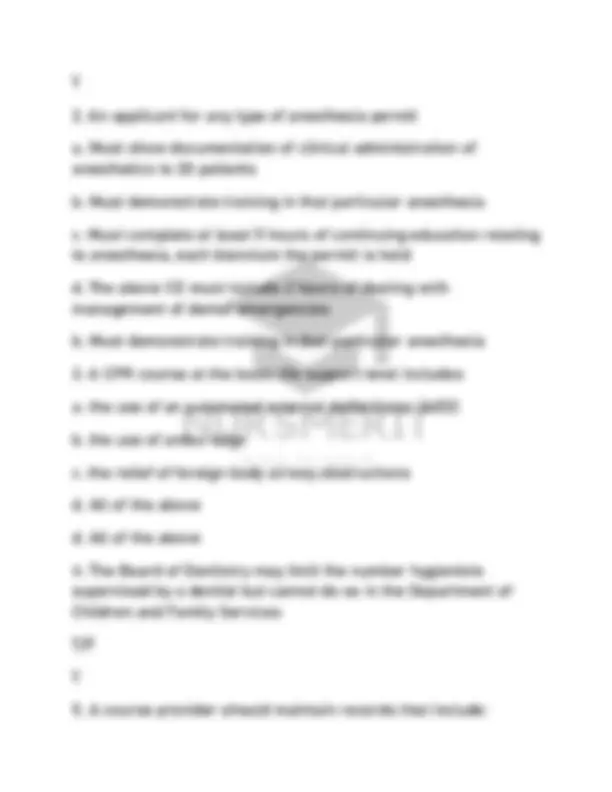
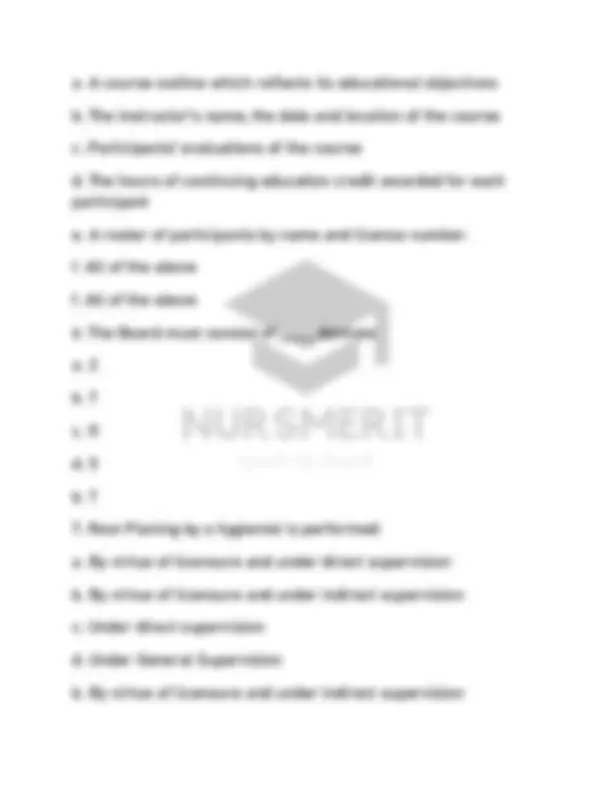
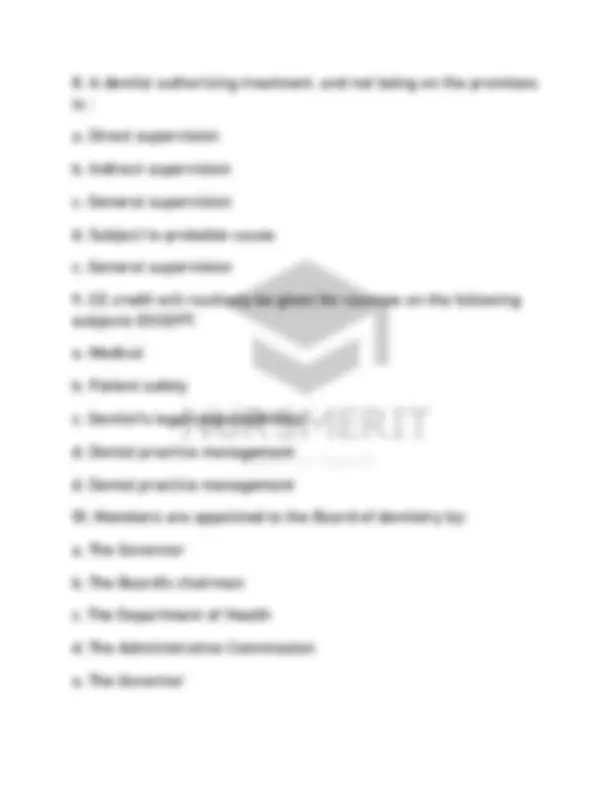
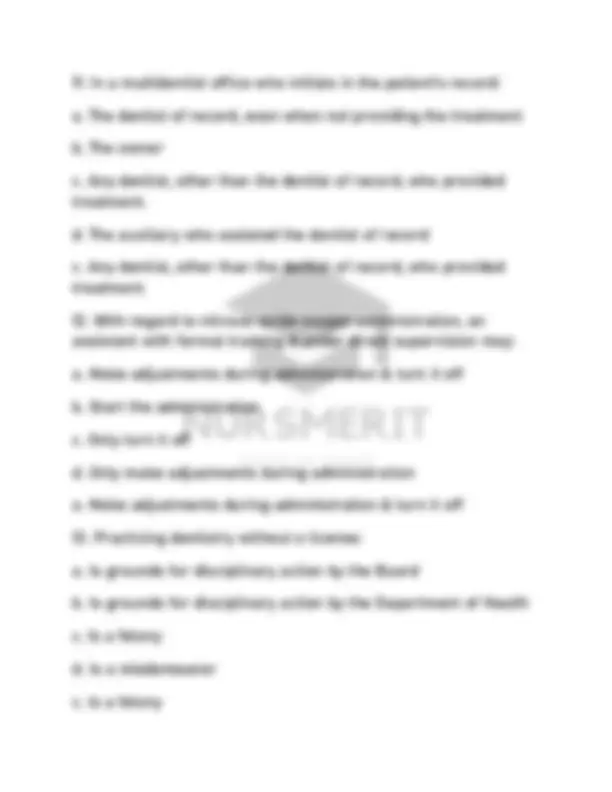
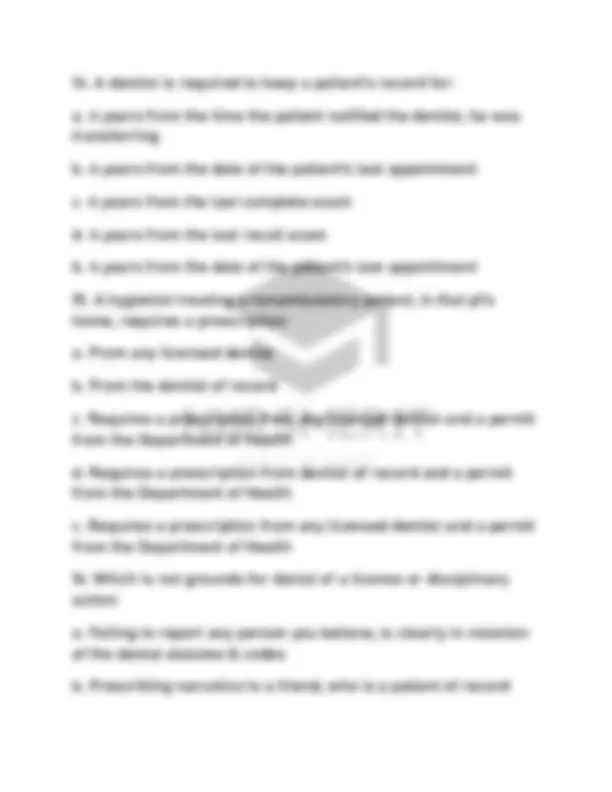
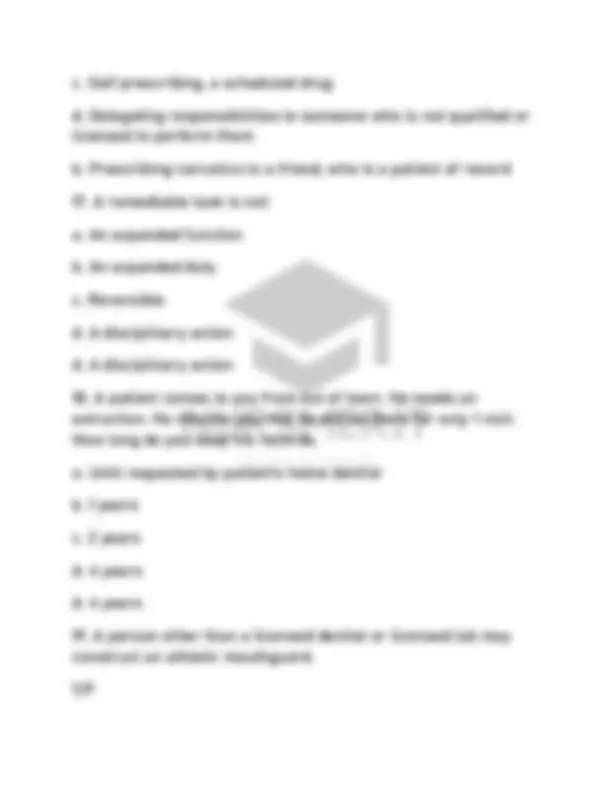
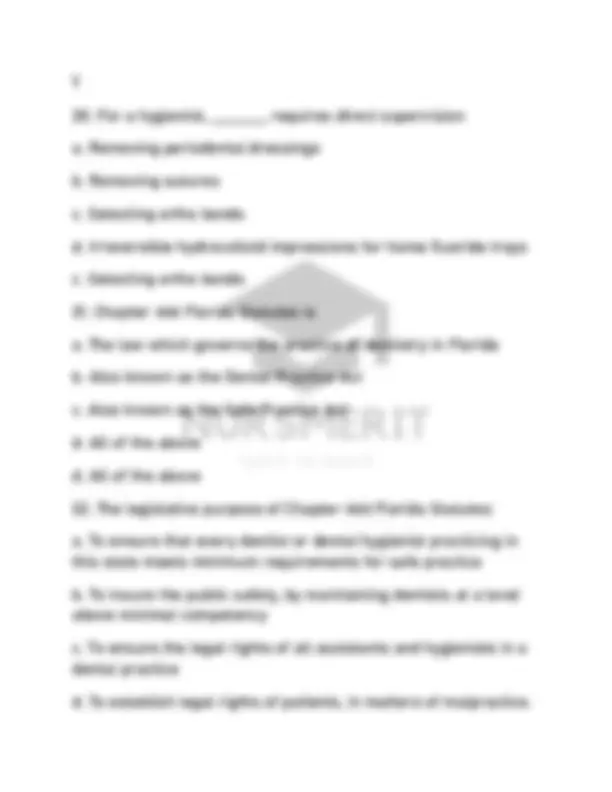
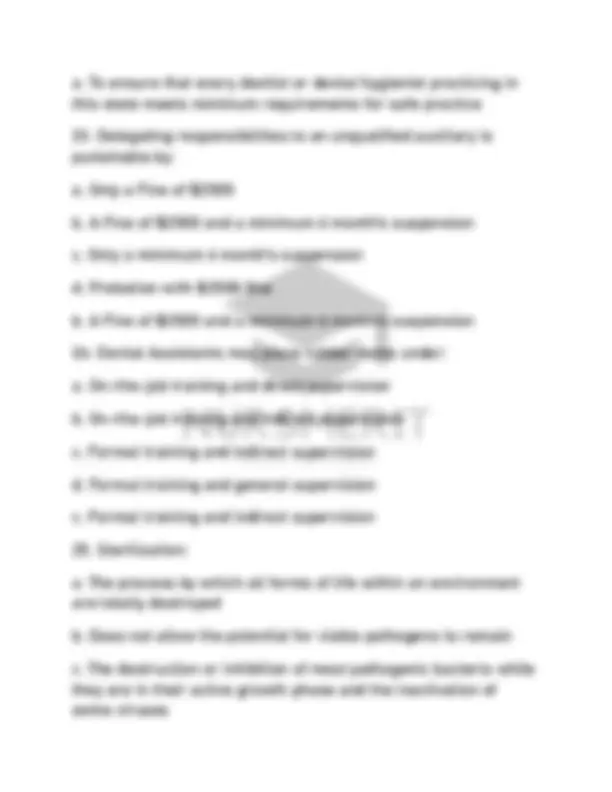
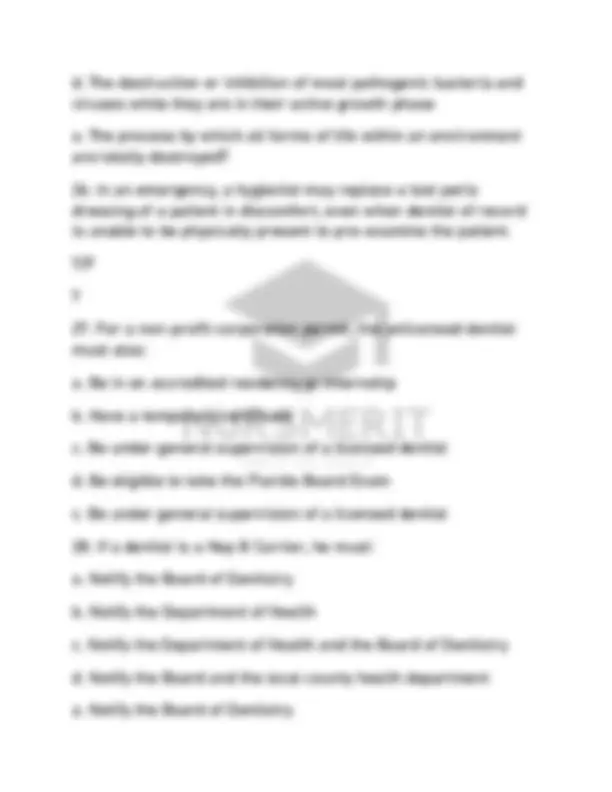
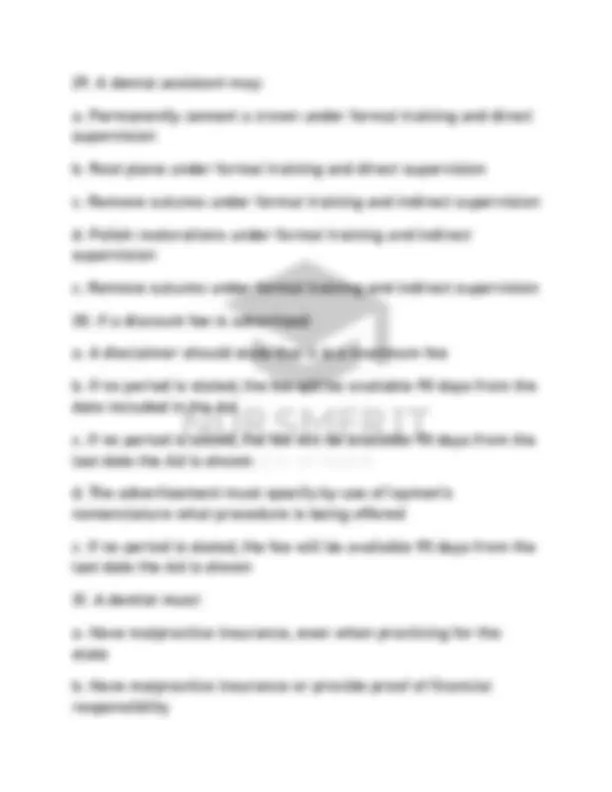
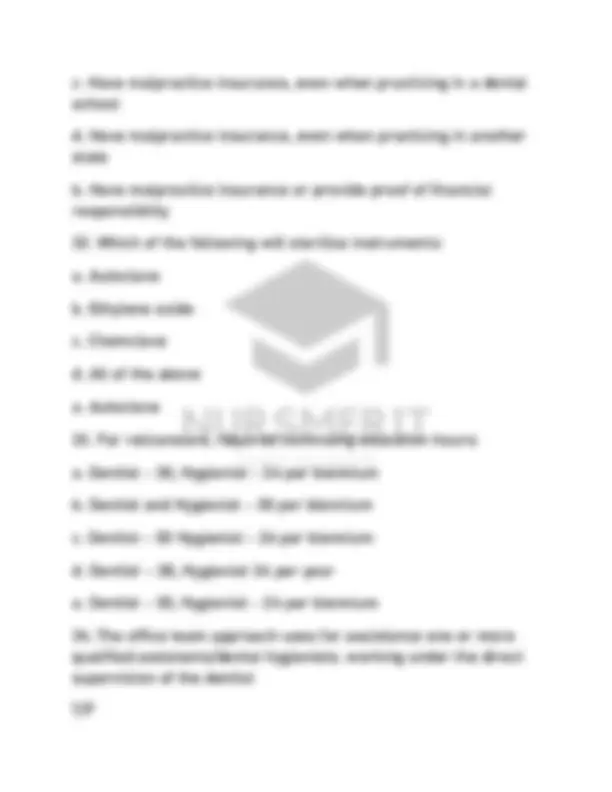
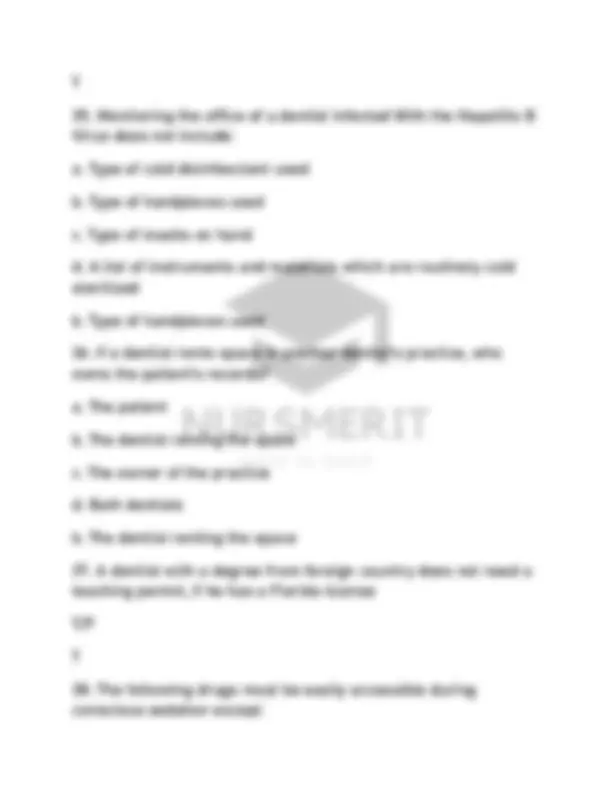
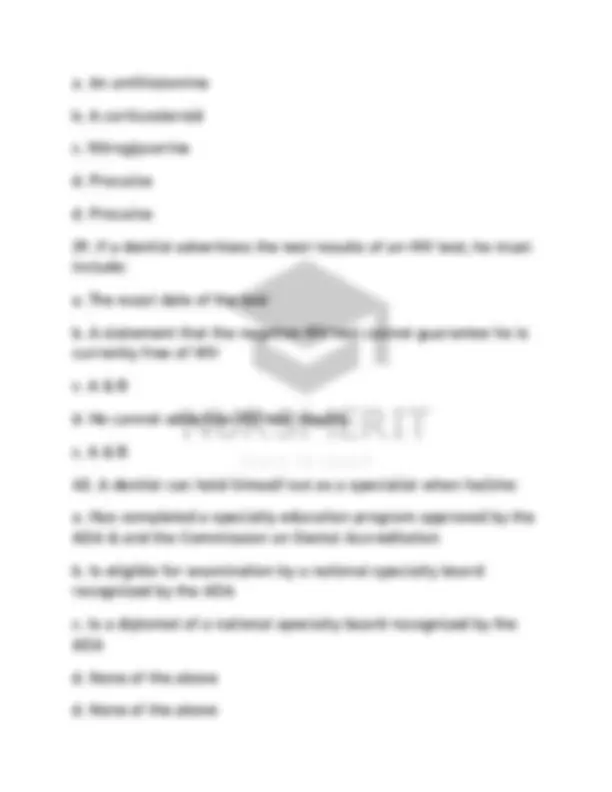
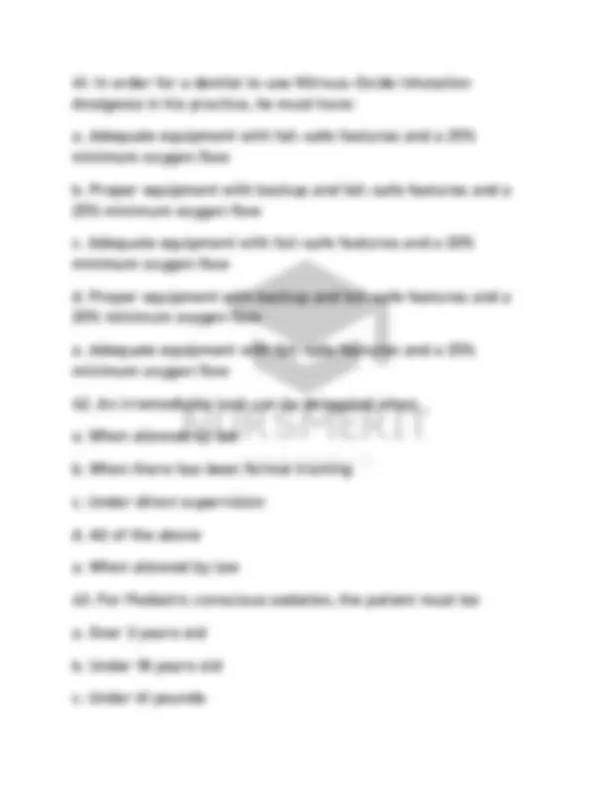
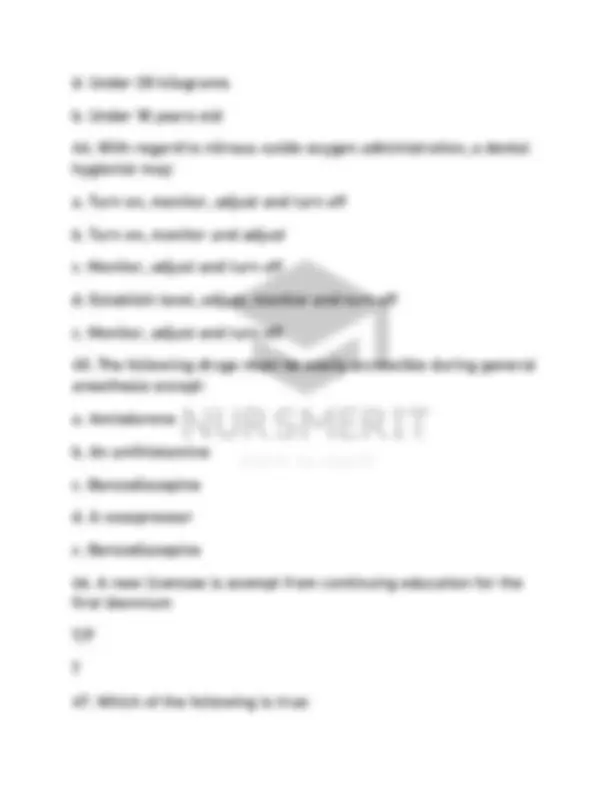
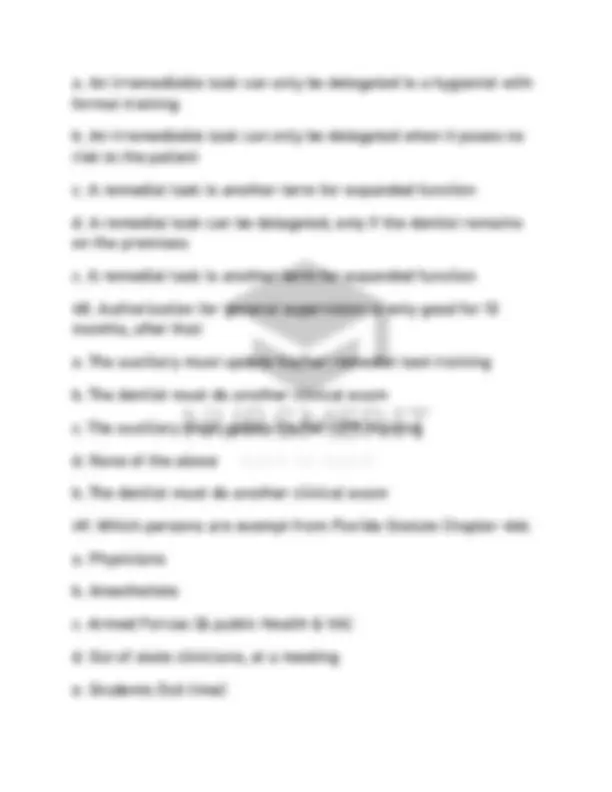
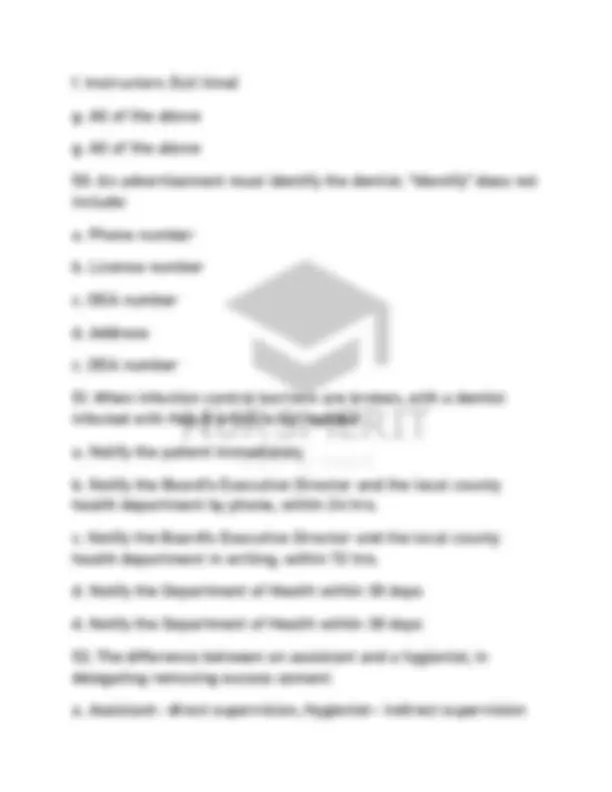
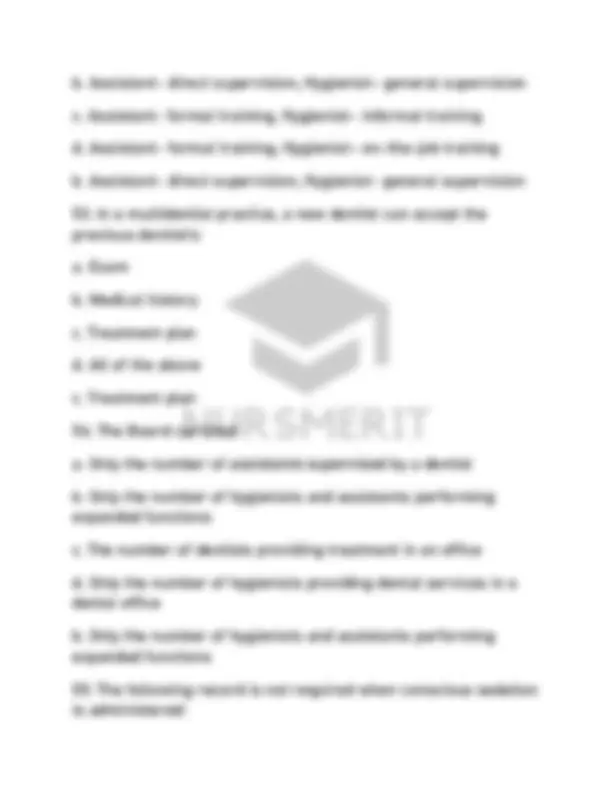
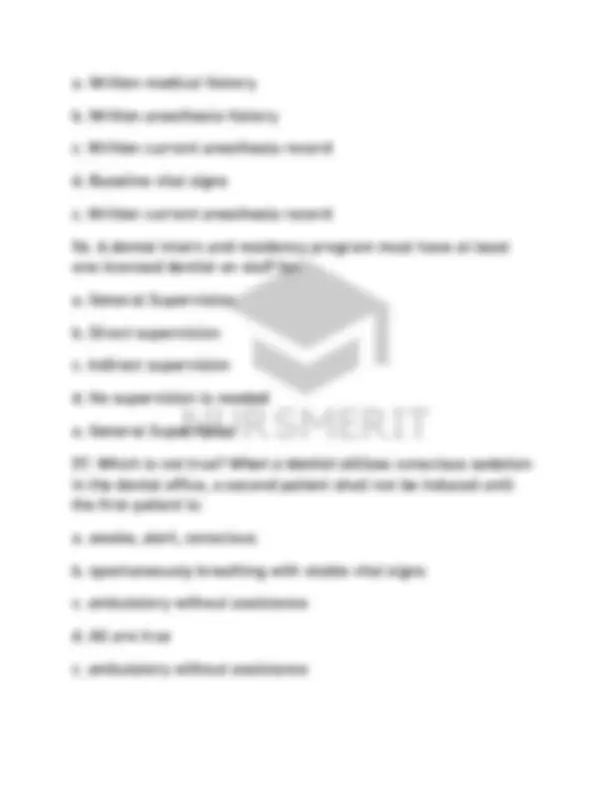


Study with the several resources on Docsity

Earn points by helping other students or get them with a premium plan


Prepare for your exams
Study with the several resources on Docsity

Earn points to download
Earn points by helping other students or get them with a premium plan
Community
Ask the community for help and clear up your study doubts
Discover the best universities in your country according to Docsity users
Free resources
Download our free guides on studying techniques, anxiety management strategies, and thesis advice from Docsity tutors
Questions and answers on Florida dental law and rules, focusing on chapters 456 and 466, and rule 64b5. Topics include dental assistant supervision, continuing education for dentists and hygienists, and dental practice regulations. Questions cover permissible tasks, malpractice insurance, and extracted teeth procedures. Designed to help professionals prepare for exams or stay updated, it includes questions on anesthesia, sterilization, and advertising. It offers a comprehensive overview of legal and ethical standards for Florida dental practices. The content tests knowledge of specific laws and rules, making it a valuable resource for compliance and best practices.
Typology: Exams
1 / 141

This page cannot be seen from the preview
Don't miss anything!





























































































Chapter 456: Chapter 466: Rule 64B5:
1. Assistants can take impressions with reversible hydrocolloid under: a. Direct supervision b. Indirect supervision c. General supervision d. None of the above d. None of the above 2. Persons not exempt from operation of chapter 466 a. Graduate dentist in the United States military b. A qualified anesthetist giving an anesthetic for a dental operation under direct supervision of a licensed dentist
c. Dental students in Florida schools, practicing outside the school curriculum d. An instructor at a Florida school, practicing dentistry, at the school c. Dental students in Florida schools, practicing outside the school curriculum
3. In a multidental practice: a. If a dentist leaves, he takes the patients records & must keep them for 4 years b. The owner dentist shall provide reasonable access to duplicate records at cost. c. The owner dentist need not maintain either the original or a duplicate of all patient records, as long as the dentist of record is still in the practice d. The owner dentist can give the records to the patient, as per a verbal request b. The owner dentist shall provide reasonable access to duplicate records at cost. 4. Regarding Dentist/DH continuing education requirements for each biennium, which is NOT true: a. Two (2) hour course on domestic violence as part of every third licensure renewal
7. A laboratory technician may verify the patient’s shade- selection outside the dentist’s direct supervision for fixed partial prosthesis. T/F T 8. A course provider should maintain course records for: a. 4 years b. 4 years following each licensure biennium during which the course was given. c. 2 years following each licensure biennium during which the course was given d. 6 years b. 4 years following each licensure biennium during which the course was given. 9. A dentist must provide malpractice insurance for himself and any hygienist under his supervision T/F T 10. Who must be notified if a dentist infected with HEP B has a barrier breakage during a dental procedure? a. The patient – immediately
b. Call Executive Director of the Board and local county health department within 24 hours. c. Write Executive Director of the Board and local county health department within 72 hours. d. All of the above d. All of the above
11. Extracted teeth can be given back to a patient: a. When the teeth are sterilized b. When the teeth are disinfected and rendered non- biohazardous c. Cannot be given back to the patient, must be treated as biohazardous waste d. Must be sealed in an impervious container and labeled “ infectious material” b. When the teeth are disinfected and rendered non- biohazardous 12. The Board must consist of __ dental assistants. a. 0 b. 2 c. 3
b. Start the administration c. Only turn it off d. Only make adjustments during administration a. Make adjustments during administration & turn it off
16. Knowingly employing a person to perform duties outside their allowable scope: a. Is grounds for disciplinary action by the Board b. Is grounds for disciplinary action by the Department of Health c. Is a felony, 3rd degree d. Is a misdemeanor, 1st degree c. Is a felony, 3rd degree 17. A dentist gets CE credits participating in a pro bono dental program: a. 1 CE credit for 2 clinical hours; maximum 7 credits per biennium b. 1 CE credit for 3 clinical hours; maximum 7 credits per biennium c. 1 CE credit for 2 clinical hours; maximum 6 credits per biennium
d. 1 CE credit for 3 clinical hours; maximum 6 credits per biennium b. 1 CE credit for 3 clinical hours; maximum 7 credits per biennium THIS IS OLD INFORMATION, CURRENTLY 1 FOR 1, MAXIMUM OF 6 CREDITS
18. Who is the dentist of record in a multidentist practice a. The owner b. The dentist who did the initial exam c. The dentist currently in charge of the patient’s treatment d. None of the above c. The dentist currently in charge of the patient's treatment 19. If an advertisement does not state how long a fee is in effect: a. The fee is good for at least 30 days from the final advertisement b. The fee is good for at least 90 days from the final advertisement c. The fee is good for a the duration of the advertisement d. It is illegal not to state a specific period, during which the fee is in effect
d. John Pain, DDS, General Dentist, PracticeSpecializing in Endodontics b. John Pain, DDS, General Dentist, Practice limited to Endodontics
23. To renew a license, a dentist and hygienist must take: a. A 2 hr domestic violence course every biennium b. A 2 hr domestic violence course every 3rd biennium c. A 3 hr domestic violence course every 3rd biennium d. A 2 hr domestic violence course every 2nd biennium b. A 2 hr domestic violence course every 3rd biennium 24. Disinfection: a. The process by which all forms of life within an environment are totally destroyed b. Does not allow the potential for viable pathogens to remain c. The destruction or inhibition of most pathogenic bacteria while they are in their active growth phase and the inactivation of some viruses d. The destruction or inhibition of most pathogenic bacteria and viruses while they are in their active growth phase.
c. The destruction or inhibition of most pathogenic bacteria while they are in their active growth phase and the inactivation of some viruses
25. Violations of Chapter 466 or Chapter 64B-5 are to be reported to: a. The Board b. The Department c. County Health Department d. The Committee on Disciplinary Action b. The Department 26. In a multiowner practice who is responsible for the treatment provided? a. The owner, who may or may not be a dentist b. The owner, who must be a dentist c. The dentist who provided the treatment d. The owner and the dentist who provided the treatment c. The dentist who provided the treatment 27. The “window” period is:
c. Scaling & root planning d. Removal of calculus & stain d. Removal of calculus & stain 30.Which of the following will not provide sterilization: a. Dry Heat b. Steam under pressure c. Chemical vapor d. Radiation d. Radiation
31. If a dentist relocates his practice, which of the following is true: a. If relocating within the same local area he should post a notice of relocation at his practice for one month prior to relocation. b. If relocating out of the local area he should publish in the newspaper, advising patients of his relocation. c. A & B d. He must post a notice & advertise in the paper, within 30 days, a notice of relocation c. A & B 32. Presenting a lecture in a course at a dental, dental hygiene or dental assisting school, gives you a. 1 hour of CE credit for each 50-minute
b. 2 hours of CE credit for each 50-minute c. 1 hour of CE credit for each 50-minute;maximum of 15 hours per biennium d. 2 hours of CE credit for each 50-minute;maximum of 15 hours per biennium d. 2 hours of CE credit for each 50-minute;maximum of 15 hours per biennium
33. A dentist can hold himself out as a specialist only when: a. Has completed a specialty education program approved by the ADA or the Commission on Dental Accreditation b. Has passed an examination by a national specialty board recognized by the ADA. c. The rule is unclear d. Has continuously held himself out as a specialist since 1968, in a specialty recognized by the ADA. c. The rule is unclear
34. Board approved individual study includes: a. The initial presentation of material, at a course, conference, meeting etc. b. Publication of an article or book
d. Checking for proper handpiece disinfection
37. A dentist dispensing chlorhexidine rinse solutions is exempt from being a “Dispensing Practitioner” A dentist prescribing chlorhexidine rinse solutions is exempt from being a “Dispensing Practitioner” a. Only statement #1 is true b. Only statement #2 is true c. Both statements are true d. Neither statement is true c. Both statements are true 38. Participating as an expert witness in the review of disciplinary cases, a dentist can get credit for: a. Maximum 11 continuing education credits per biennium b. Maximum 12 continuing education credits per biennium c. Unlimited continuing education credits per biennium d. No continuing education credits a. Maximum 11 continuing education credits per biennium 39. The following drugs must be easily accessible during conscious sedation except: a. Amiodarone b. Vasopressor c. Antipertensive
d. Anticonvulsant c. Antipertensive
40. Applying sealants is allowed under: a. Assistants– Formal training and general supervision b. Assistants– Formal training and indirect supervision c. Hygienists– On the job training and direct supervision d. Hygienists- Formal training and indirect supervision b. Assistants- Formal training and indirect supervision 41. When advertising, a dentist can: a. Use telemarketing to build a practice b. State that he specializes in bleaching c. Place an Ad in a newspaper d. Mention his success with dentures in a telephone book Ad c. Place an Ad in a newspaper 42. In addition to fees,to reactivate a license, the dentist may need to submit: a. Proof of 30 hrs of continuing education b. Proof of continuing education, 15 hrs. per inactive year c. An affidavit to establish the ability to practice with care and skill.
a. Every dental office b. An oral surgeon’s office only c. An office using general anesthesia, conscious sedation, or pediatric conscious sedation only d. None of the above a. Every dental office
47. Placing subgingival resorbable chlorhexidine, doxycycline hyclate, or minocycline hydrochloride, can be delegated: a. To a hygienist under indirect supervision, to an assistant under direct supervision b. To a hygienist under general supervision, to an assistant under indirect supervision c. To a hygienist under indirect supervision, cannot be delegated to an assistant d. Cannot be delegated to any auxiliary c. To a hygienist under indirect supervision, cannot be delegated to an assistant
48. A dentist cannot prescribe: a. Narcotics b. Antihistamine c. Growth hormone
d. Tranquilizers c. Growth hormone
49. The minimum penalty for being unable to practice dentistry, because of use of alcohol is: a. License suspension until licensee demonstrates ability to practice with reasonable skill and safety, followed by conditional probation and a fine up to $5 000 b. License suspension until licensee demonstrates ability to practice with reasonable skill and safety, followed by conditional probation. c. License revocation until licensee demonstrates ability to practice with reasonable skill and safety, followed by conditional probation. d. License suspension until licensee is cleared to resume practice, after a mental and physical examination by physicians designated by the department, followed by conditional probation. a. License suspension until licensee demonstrates ability to practice with reasonable skill and safety, followed by conditional probation and a fine up to $ 50. How is the limit of hygienists in the Department of Children and Family Services determined? a. By the Board b. By the Department c. By the number of dentists practicing there